REMEMBERING DR. JOHN FOZDAR
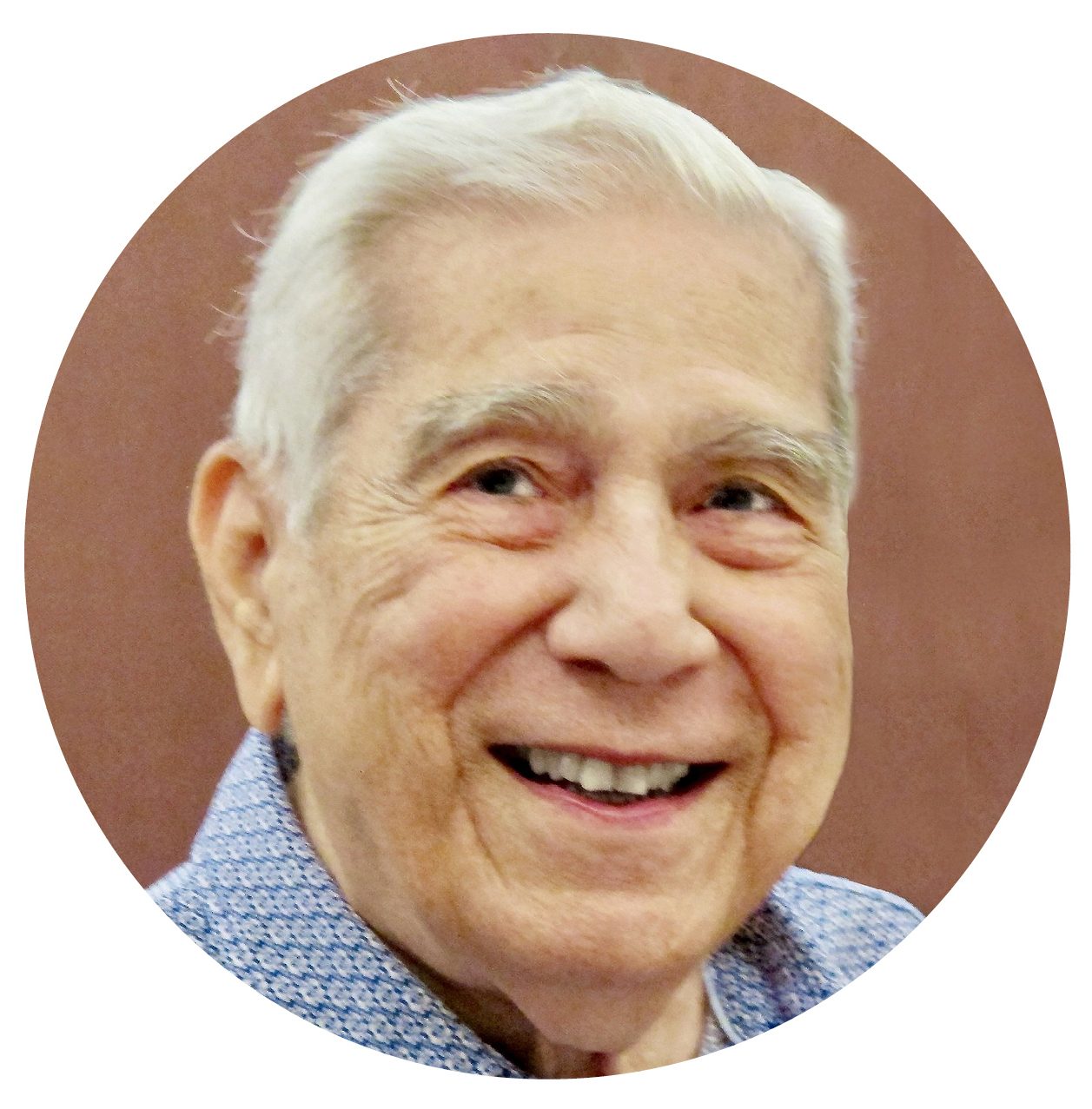
2 July 1928 – 22 October 2022
We were grieved to learn of the passing of John Fozdar, consecrated servant of the Faith of God. His decades-long pioneering to different countries in Southeast Asia, in particular his move to Brunei, which won him the accolade of those listed in the Roll of Honour of Knights of Bahá’u’lláh, is recalled with great admiration. His manifold services, including as a member of the Continental Board of Counsellors in Asia and as a member of the Spiritual Assemblies of Malaysia and Sarawak, leave an enduring legacy for future generations. To his wife and children and other family members we extend our wholehearted condolences and assure them of our ardent supplications at the Sacred Threshold for the progress of his radiant soul in the eternal realms.
We call on you and the Spiritual Assemblies of Malaysia and Sabah as well as the Administrative Committee of Brunei to hold memorial gatherings in his honour in your respective communities and, by copy of this message, ask the National Spiritual Assembly of India to arrange a befitting service in the Bahá’í House of Worship in New Delhi.
– The Universal House of Justice to the Spiritual Assembly of the Bahá’ís of Sarawak dated 23 October 2022
Dr. John Khodadad Fozdar, born in Bombay on 2 July 1928 was one of the wondrous gems created by the wondrous hands of Bahá’u’lláh. He became a pioneer to Brunei in April 1954 and won the love of the Guardian who designated him a Knight of Bahá’u’lláh. He served the Cause in numerous capacities, winning the love and admiration of multitudes of individuals across the globe and institutions as well. His services and legacy are forever there to decorate the pages of history for all generations to come to admire and emulate. It is difficult to render adequate tribute to a believer so outstanding and precious.
Dr. John was the second son born into an illustrious family of Dr. Khodadad Muncherji Fozdar and Shirin Fozdar. In 1944 he enrolled in the pre-medical, inter-science course at a university in Ahmedabad and in 1944 entered the medical school at Bombay University. Upon completing his studies in medicine in India he joined his pioneer parents in June 1951 in Singapore, serving as a medical officer with the Singapore General Hospital for three years. He was elected to serve on the first Local Spiritual Assembly in Singapore formed in Riḍván 1952. The following year he attended the Intercontinental Conference held in New Delhi, India from 7 to 15 October with his parents Dr. Khodadad and Mrs. Shirin Fozdar, his brothers Jamshed and Minoo, and his sister Zena. While the family had already by then developed a strong ethic of dedication and service, the conference inspired them to apply themselves yet more ambitiously. Much could be written on each family member, yet this story confines itself to Dr. John alone. Responding to the call for pioneers at the conference, his father Dr. Khodadad Fozdar arose to pioneer to the Andaman Islands while Dr. John arose to pioneer in Brunei. He later wrote of that time:
“During the 10 Year Crusade conference in New Delhi in October 1953, there was a call for pioneers to arise and settle in the Sultanate of Brunei, which was one of the goal territories. The goal was assigned to Iran. Just a short while earlier, Iran, under Mossadegh, had nationalised the Anglo-Iranian Oil Company and driven the British out. Although the British came back and Mossadegh was out of power, the feeling against Iran was strong. I felt that it would not be possible for any Iranian to enter Brunei, which was a British Protectorate. I felt it would be shameful if the Guardian called for pioneers and no one could go. So I offered to go to Brunei and serve there. My offer was gladly accepted by the Hands of the Cause, Mr. Faizi and Dr. Ugo Giachery…”
The Guardian was pleased to learn of the father and son arising to fulfil the goals of the Ten Year Crusade and both were designated as Knights of Bahá’u’lláh.
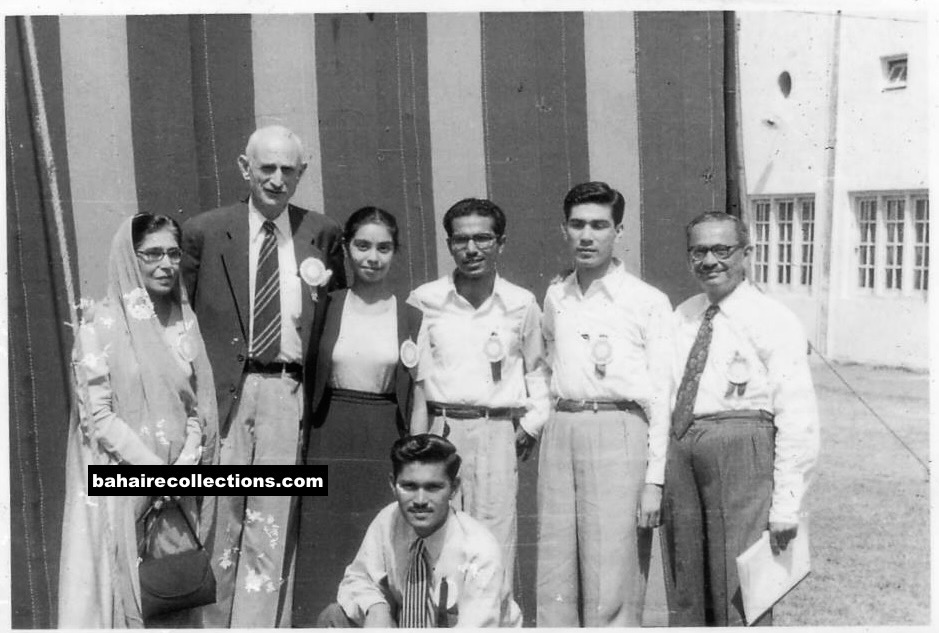
The 1953 Intercontinental Conference in Delhi – the Fozdars getting ready to leave India. Standing L-R: Shirin Fozdar, Hand of the Cause of God Ugo Giachery, Zena Fozdar, Minoo Fozdar, John Fozdar and K. M. Fozdar. Squatting is Jamshed Fozdar.
After travelling on the S.S. Kimanis to Labuan, on 9 April, 1954 John made the final journey to Brunei at night. When his launch reached the jetty he saw a white man and a black man standing there – Knowing that two other Bahá’í pioneers had just arrived from the United States two months before, he walked up to them saying, “You must be Harry Clarke and Charles Duncan”. They were surprised as they did not know that he was arriving in Brunei. Harry and Charles were also designated as Knights of Baha’u’llah for Brunei.
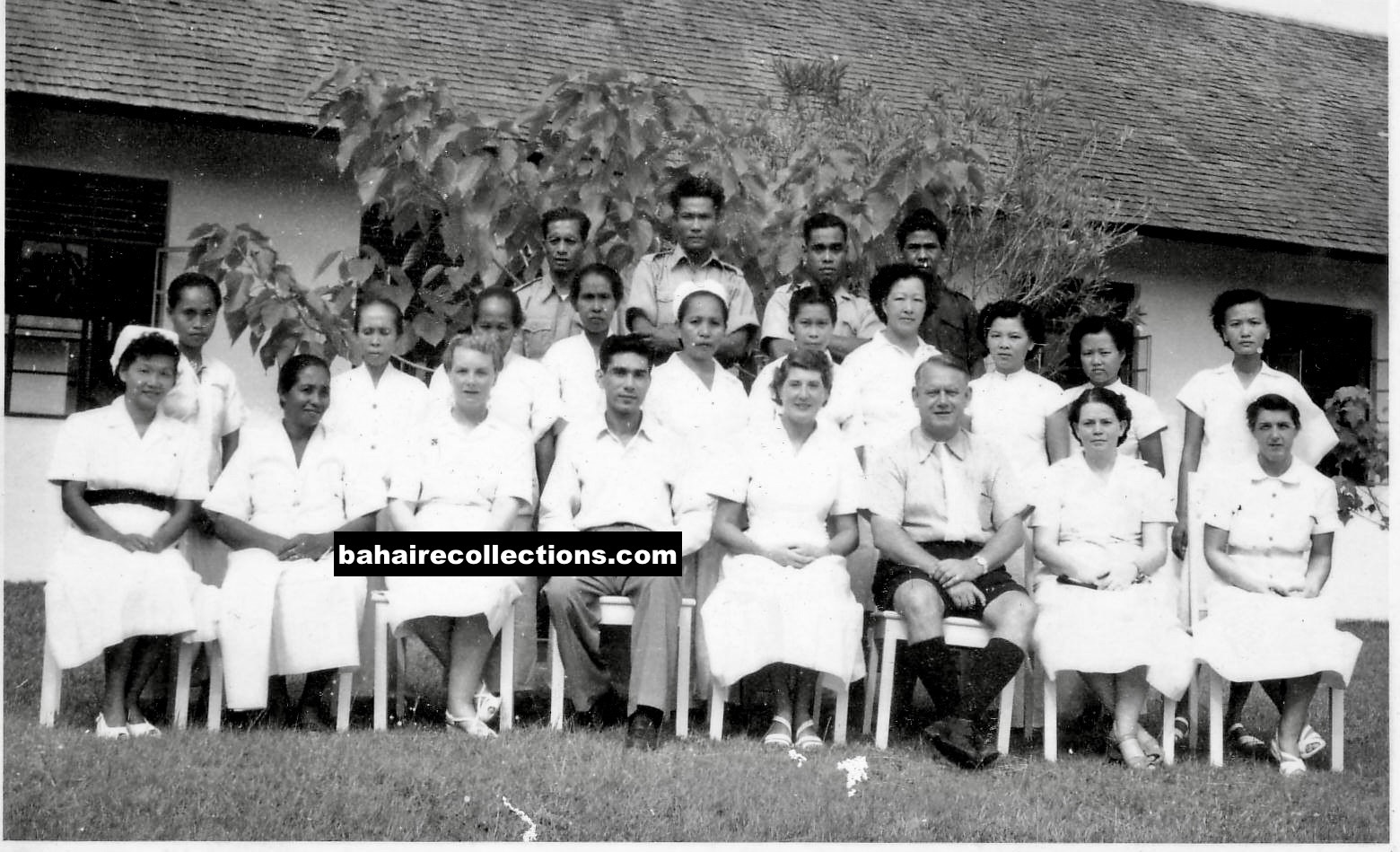
With Government Hospital staff of Brunei 1956-57. From right: Sister Betty Hurley, Dr. DeSilver, Dr. Vardy (Director of Medical Services). Dr. John is seated fourth from left
Dr. John worked in the government hospital of Brunei. His younger brother Minoo arrived in Singapore on a stopover in order to proceed to the Cocos Keeling Islands that the Guardian had wanted him to go but owing to some miscommunications he was stranded in there. Then on the invitation of John he went to Brunei in December 1954 and worked with the Brunei government as an accountant in the Treasury until 1970, when he left for Australia. The first believer in Brunei was one Mr. Cheok, a businessman from the Chinese community.
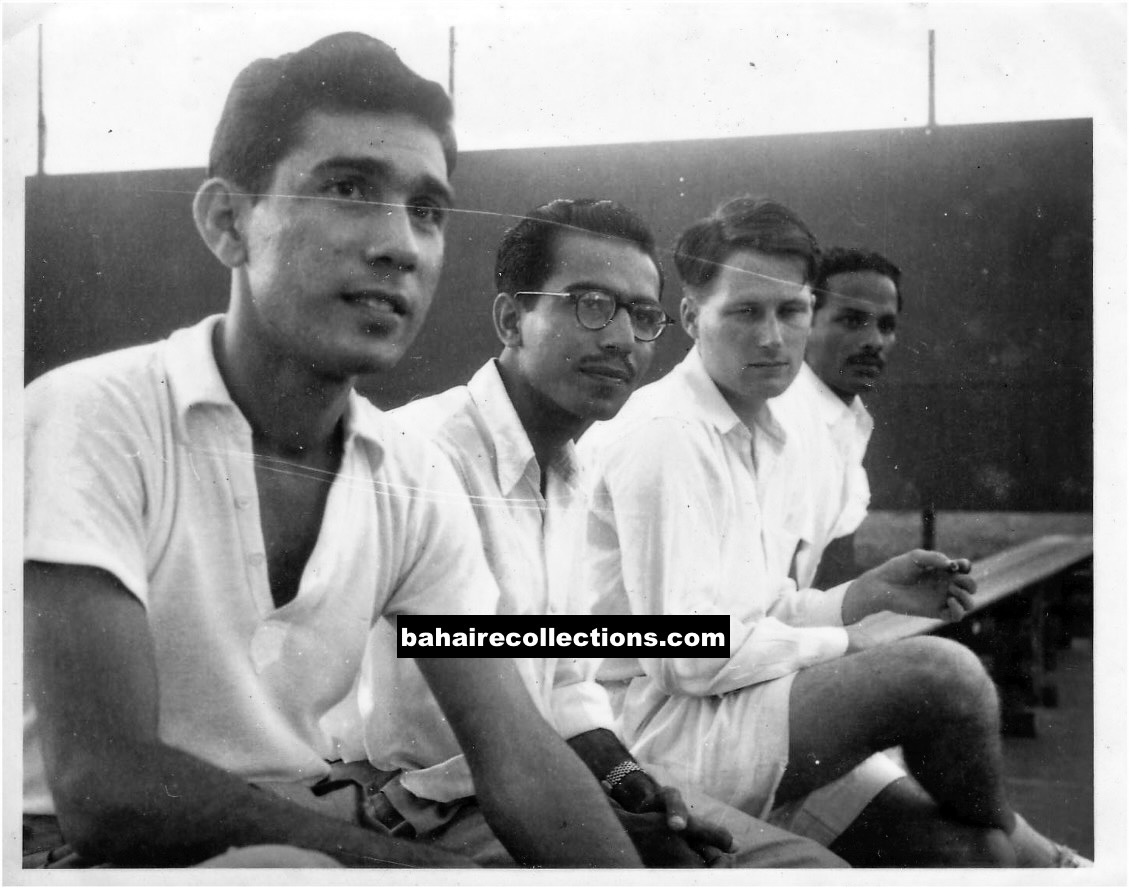
Brunei, 1958. L-R: Dr. John, Minoo, Patrick Adamson a school teacher and Rajaratnam, the Airport Manager
When in Singapore in early 1950s and after entering Brunei in 1954, Dr. John continued participate in some of the events in Malaya. And now let us follow some recollections taken from the notes of Dr. John of his early days in Brunei:
In a small place like Brunei, it was easy to get to know everyone. My relations with the British authorities were very cordial, as I was well-placed. Relations with the Sultan were also warm, and we knew one another, but language was a barrier, and I was woefully ignorant about protocol. He knew about the Faith in our short conversations. Other prominent Malays who were very warm towards me were the Penghiran Bendahara and Penghiran Pemancha. Also, the Chief Kathi of Brunei Pengiran Mohd. Salleh bin Pengiran Haji Mohd. and his son-in-law, Pengiran Dato Kamaluddin bin Haji Metussin and his family were friends and patients of mine. On one occasion, the chief Kathi asked me if the Bahá’ís would ask for land for the Faith. In my ignorance, I said that Bahá’ís did not accept gifts from non-Bahá’ís, and he was very surprised. He would invite me to his house in Kampong Ayer in Brunei and he was friendly. Pehin Shahbandar Haji Ahmad was also a good friend. After staying in Brunei for more than two years, I was nearing the end of my contract with the Government of Brunei. I had to make plans for furthering my career. I informed the authorities that it was my intention to leave on completion of my contract and go to UK to finish my surgical studies. Of course, the people of Brunei were unhappy. I had got to know everyone. All strata of the population were keen that I stay there. The palace, the government, the staff, the population were genuinely sorry that I was leaving Brunei. I was told that delegations had seen the Sultan and the Prime Minister and urged them to try and retain my services as a doctor in Brunei. The Prime Minister, Datuk Ibrahim Ja’afar, consulted with the palace and the British authorities, and made me an offer which was difficult to reject. He said that if the government were to send me to UK on a government scholarship, would I consent to go back and serve them for a further five years. I remember my feelings that everywhere else, pioneers are struggling so hard to remain at their posts with the fear of being expelled – and here, I was being invited by a Muslim government to go back by special invitation. I informed Datuk Ibrahim that I would agree to such an offer. He then asked me to write to the government, asking for a scholarship to study and consenting to be bound to return for a further five years of service. And I did this. I learned afterwards that I was the first non-Brunei citizen to be sent on a Brunei government scholarship. As usual, I was asked to furnish two sureties about my return. My two friends, the State Electrical Engineer Mr. Rajaratnam and Shaykh Mohammad agreed to furnish the sureties. I wrote to the Beloved Guardian to state my intention and to seek his guidance and instructions. I was informed by Hand of the Cause Mr. Leroy Ioas that, as the Faith was established in Brunei, the Beloved Guardian approved my going to UK for further study and that I would return to Brunei to continue my service.
The Brunei population knew vaguely about Bahá’í by now. They knew that I was not a Christian or anything else, but a Bahá’í. They knew the name. Also, at all social events, I did not drink alcohol and it was noticeable. I was not Muslim either, but something else. The government may have first heard of the name in 1955 when the instructions from Haifa asked all Bahá’í localities to send a message to the Shah of Iran asking for justice following the attempted demolition of the dome of the Haziratu’l Quds in Tehran. I also sent off a telegram as instructed. Two days later, while playing tennis with the Minister of Posts, Penghiran Kerma Indra, he told me that I had sent a cable to the Shah of Iran. I asked him how he knew about it, and he said that he had to vet the message to a Head of State, and he also consulted with the British authorities. He got the clearance, and the message was sent off. We informed the World Centre about the actions taken.
In April 1957, Dr. John Fozdar left for the United Kingdom to pursue studies to obtain a Fellowship of the Royal College of Surgeons (FRCS). In the United Kingdom he stayed in the Indian Students Hostel but later moved and worked in Cardiff where he was a boarder with David and Marian Hofman. He passed his examinations in Edinburgh. In Riḍván 1957, when Dr. John was away for further studies, the first Local Spiritual Assembly was elected in Brunei with members, among others, Mr. Minoo Fozdar, Mr. Chin Yun Sang, Miss Kong, Mr. Cheok Chin Hong, Mr. Robert Cheok, Mr. Rama Tribhuvan and Mr. Siah Teck Heng.
Meanwhile Dr. John attended the 1957 Irish Summer School, where he met Miss Margarethe Frener for the first time. They were married on 22 November 1958 during a Bahá’í weekend school in Torquay, England (with the civil registration being in Cardiff, Wales).
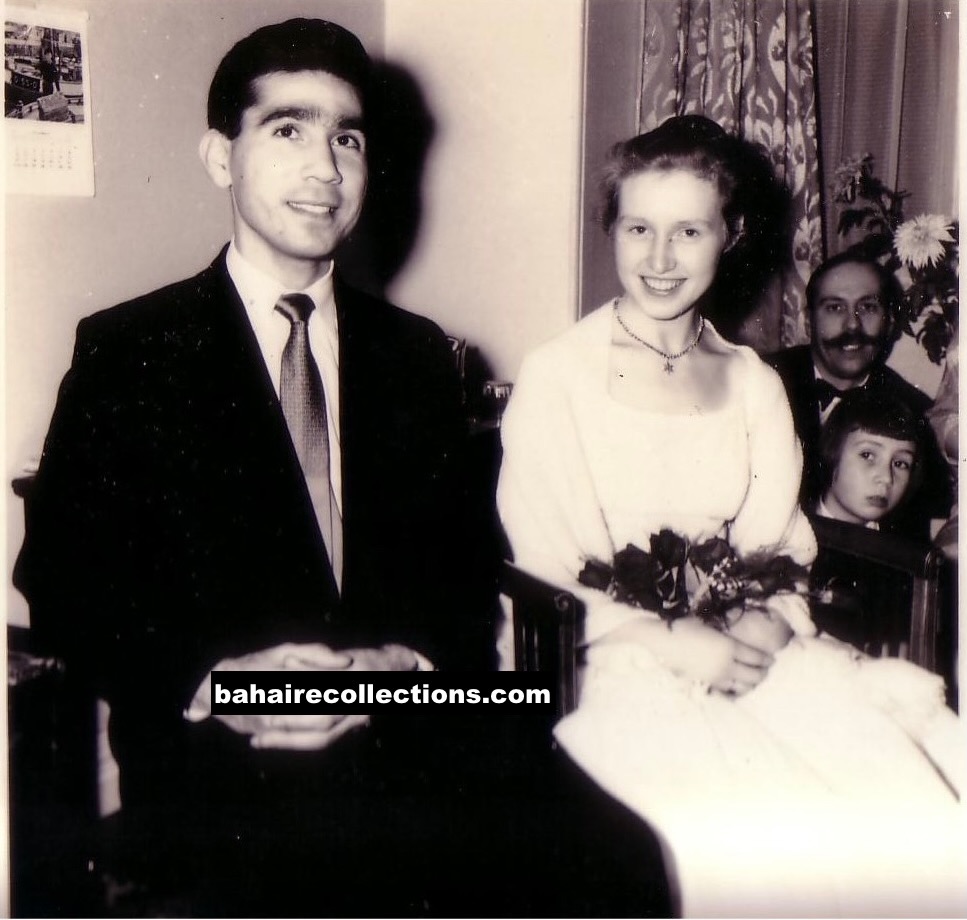
Their marriage in Torquay, England
Travelling to their pioneering post in Brunei, the couple undertook pilgrimage to the Holy Land in November 1959 together with their three-month old daughter Shirin.
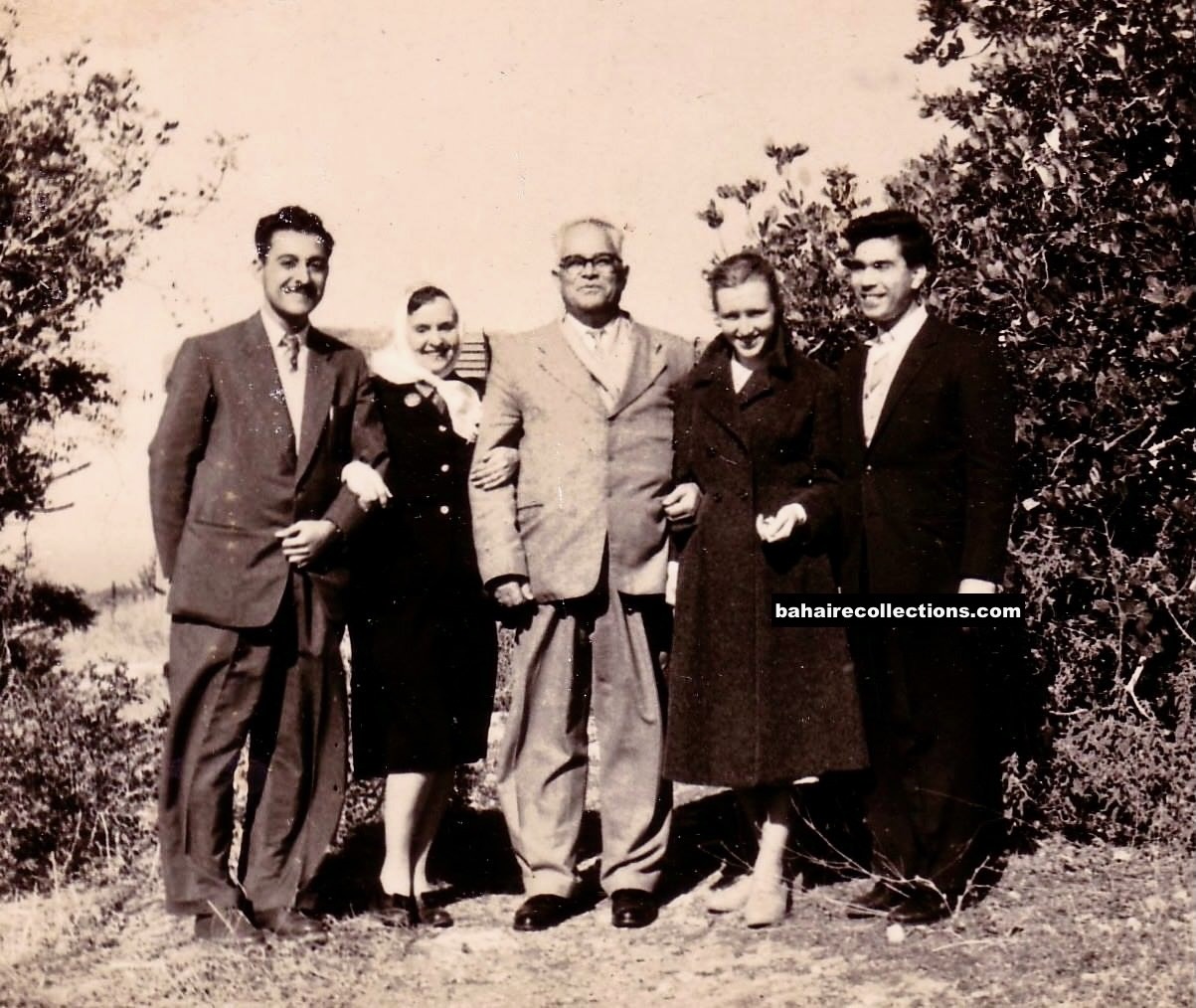
Pilgrimage to the Holy Land in November 1959. In the middle is Hand of the Cause of God Mr. Jalal Khazeh and to his left are Dr. John and Grete
From the Holy Land they travelled to Brunei after passing through India and Singapore. There Dr John started to play a greater role in Bahá’í activities in Brunei and in the entire region of Southeast Asia. Upon returning to Brunei Dr. John again worked in the government hospital, this time as a Specialist Surgeon. His first year back with his new wife and young daughter was happy and uneventful. Introducing people to the Faith was an important part of their lives. However, in 1960 a new political situation changed the situation dramatically. Many of the incumbent medical heads of department were replaced in line with race-based appointment policies, and there was a strong drive to similarly replace the doctors then in service of the Brunei government. The new State Medical Officer made Dr. John’s situation very difficult, through a combination of removing trained staff and equipment from his surgical unit, and also vigorously encouraging patients to sue Dr. John for what he said was professional negligence.
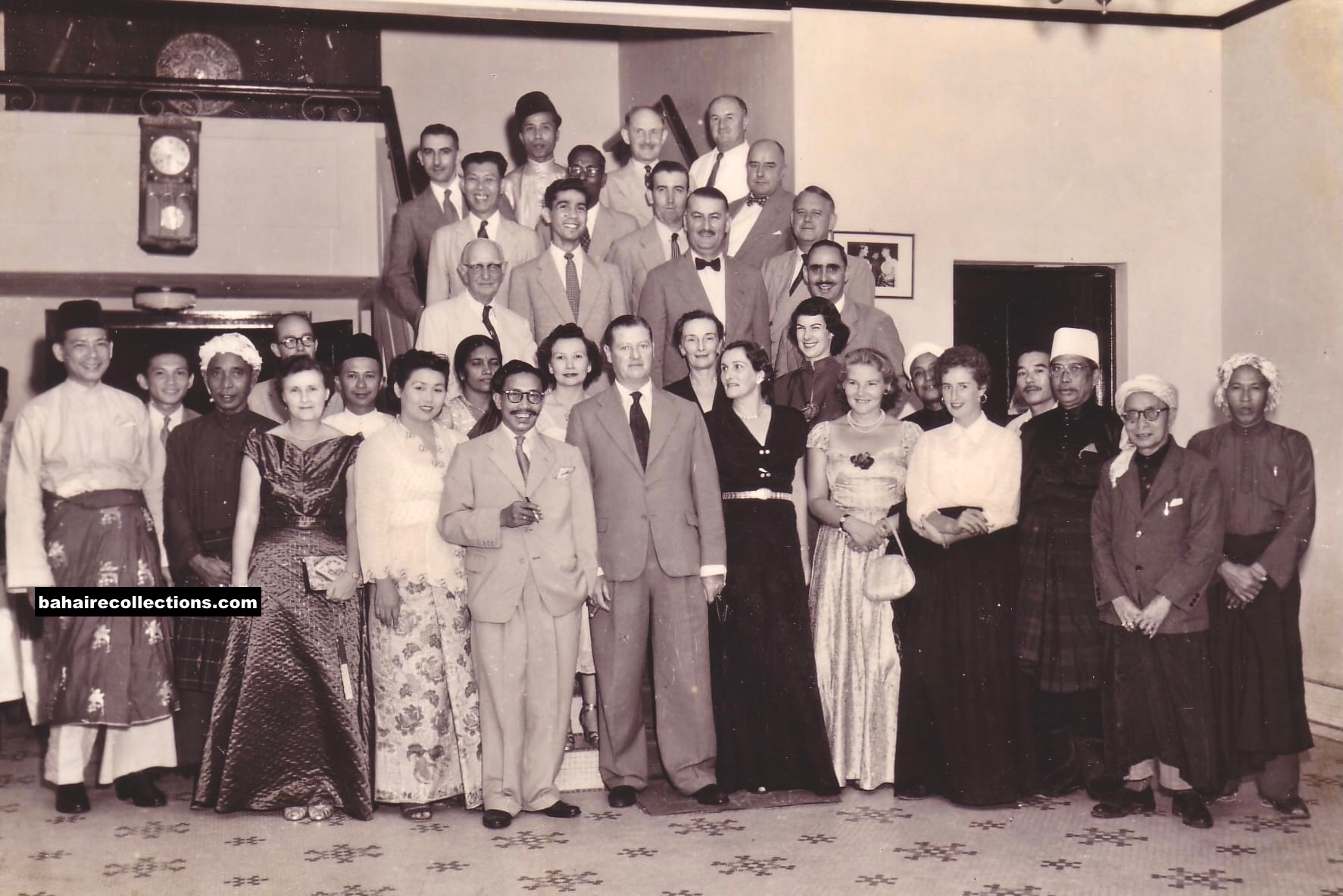
Reception with Omar Ali Saifudden III Sultan of Brunei, in the 1950s. Dr. John stands second from left in the third row
Dr. John later recalled:
Having to work under such pressures, a heavy workload because we were doing operations never been done before in Brunei, with largely untrained staff and a constant shortage of equipment, I developed bleeding gastric ulcers and was hospitalised in Shell Oil Company’s Seria hospital … In every calamity, there is some good. While I was lying in Seria hospital, I was approached by a hospital assistant who was into Sarawak politics. He would ask me to vet the language of the constitution he was drawing up for his political party. We would chat for long periods during the night. I advised him to be a statesman for the whole country and not merely a politician promoting narrow interests.
This man was Dato Stephen Kalong Ningkan, who subsequently became the first Chief Minister of Sarawak and the founder of the Sarawak National Alliance Party (SNAP). At various social functions in Sarawak, he would always introduce me as Dr. Fozdar who had been his patient. The other guests would assume that he was drunk because I was the doctor and he was no longer a hospital assistant, but Chief Minister… I would then explain about our first meetings in Seria Shell hospital. In the early years, when we had difficulty bringing in travelling teachers from Malaysia, he helped to smooth the way. He was a good personal friend …
Due to the deteriorating conditions in which he was serving, the family proposed to the Custodians in the Holy Land that they leave Brunei – this was accepted. Leaving necessitated having to break the terms of his Brunei government scholarship and repaying the financial bond. This was done with difficulty and great sacrifice – John’s mother Shirin even sold her house in Singapore to assist with the repayment.
From 1960 to 1963 Dr. John was elected to serve on the Regional Spiritual Assembly of the Bahá’ís of South East Asia, which was the administrative body for Borneo, Brunei, Cambodia, Indonesia, Laos, Malaya, Mentawai Islands, Philippines Islands, Portuguese Timor, Sarawak, Thailand and Vietnam before this body was dissolved in 1964 to give way to the election of the National Spiritual Assemblies for those respective countries. During this period on the Regional Spiritual Assembly, his mother Shirin Fozdar and his eldest brother Jamshed were also members. This Regional Spiritual Assembly came out with its first official news bulletin called the “Bahá’í Newsletter of the Regional Spiritual Assembly of South East Asia” from the first year of its formation in 1957. When the Bahá’í Newsletter took the name of “Bahá’í News” Dr. John Fozdar edited this it from 1962 to 1964. It published interesting historical records in the form of articles, news items, quotations from the holy writings, and letters from the Hands of the Cause of God in the Holy Land. While in circulation this newsletter was highly popular and in demand, bringing much pleasure to the Hands of the Cause in the Holy Land.
During Riḍván 1961, Dr. John was elected to the Local Spiritual Assembly of Brunei and in June that year his family moved via Labuan to Jesselton (now Kota Kinabalu) in what was then the colony of British North Borneo (now the Malaysian state of Sabah). He there created indelible marks in the historical map of the Faith in many ways, while working in the Queen Elizabeth Hospital. During his nine months in Jessleton, he was able to visit places such as Papar, Kota Belud, Tamparuli, Ranau and Tenom and was able to move with those in high positions including the Governor himself. The Fozdars were often invited socially for dinners and teas and got to know most of the prominent, local Chinese businessmen and newspaper editors and reporters and of course the local politicians, one of them being Donald Stephens, first Chief Minister of Sabah. There were many opportunities to talk about the Faith to patients and he had many firesides with patients and staff.
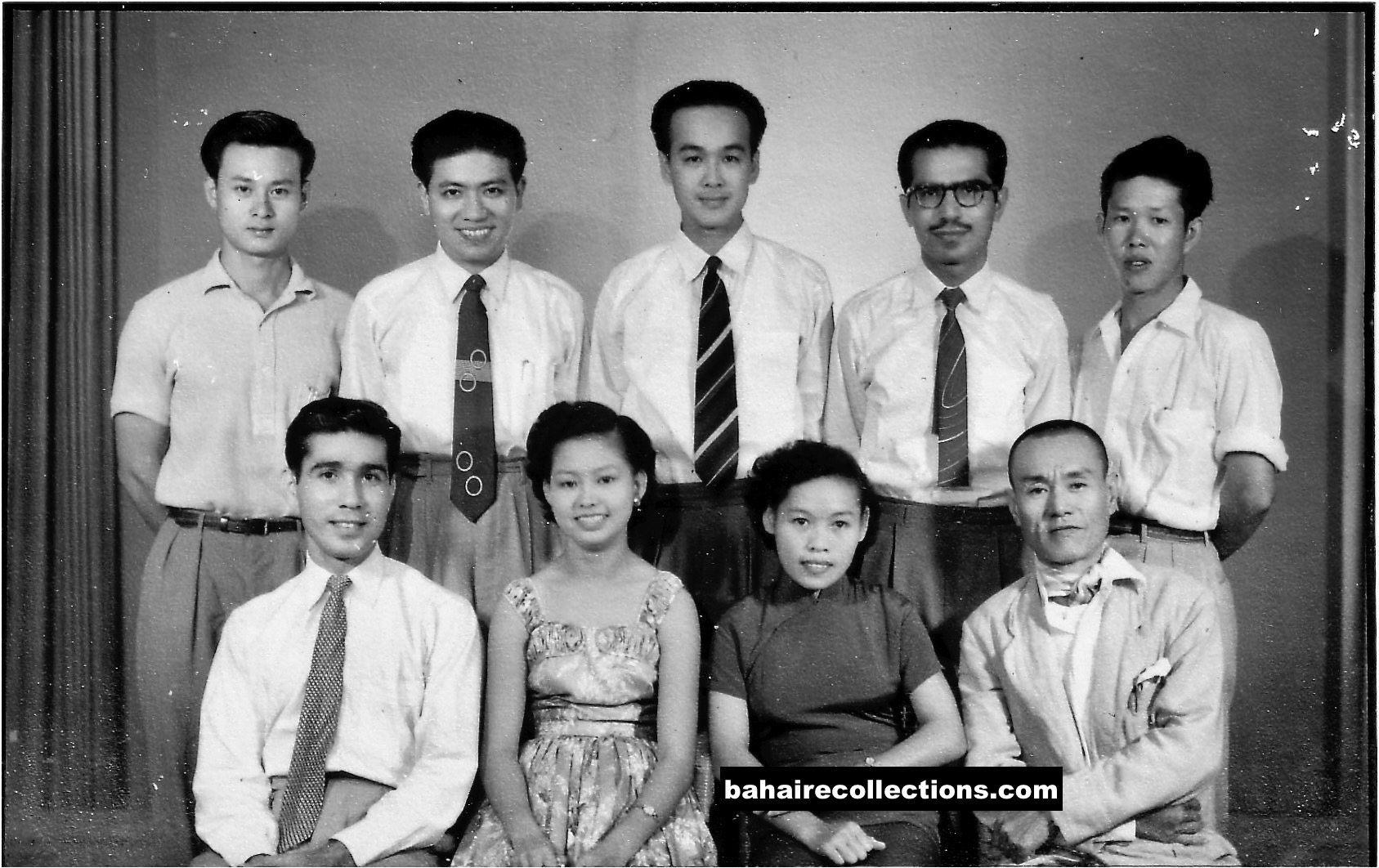
Local Spiritual Assembly of Brunei in 1961. Seated at left is Dr. John. Standing second from right is Minoo with Chin Yun Sang to his right
After serving for a year in Jesselton, Dr. John moved to Sandakan in early 1962, taking the newly created post of Surgeon East Coast at the Duchess of Kent Hospital. He introduced many new elements of surgical practice there, including a blood bank in collaboration with the Red Cross organisation, separate wards for medical and surgical patients, an upgraded surgical unit and a collection of preserved materials as surgical training aids.
The Fozdars became the first believers in that town and were successful in creating a strong community there. Their government quarters were used as a place for meetings and Bahá’í activities; regular firesides were held there. As a doctor, John saw many patients and hospital staff, and he found it easy to talk to them about the Faith. Dr. John was a very popular doctor, and had many good friends among doctors, staff and others he got to know. The earlier declarations led to a kind of natural chain effect, where the Chinese contacts spoke to family and friends, and family after family joined. Young children attract young children, and families would get together at weekends for curry lunches (with some adults afterwards leaving to play mahjong!), and everyone just enjoying the company and lunch. Many people in Sandakan knew about a doctor who taught a new religion in the Duchess of Kent Hospital. Through the teaching activities of the Fozdars there, one Koh Yaw Han became the first believer to enrol in Sandakan and the first believer in Sabah. He was also the first Chinese Bahá’í there. This was followed by another lady, Madam Foo Choi Yun, the first lady to declare in Sandakan.
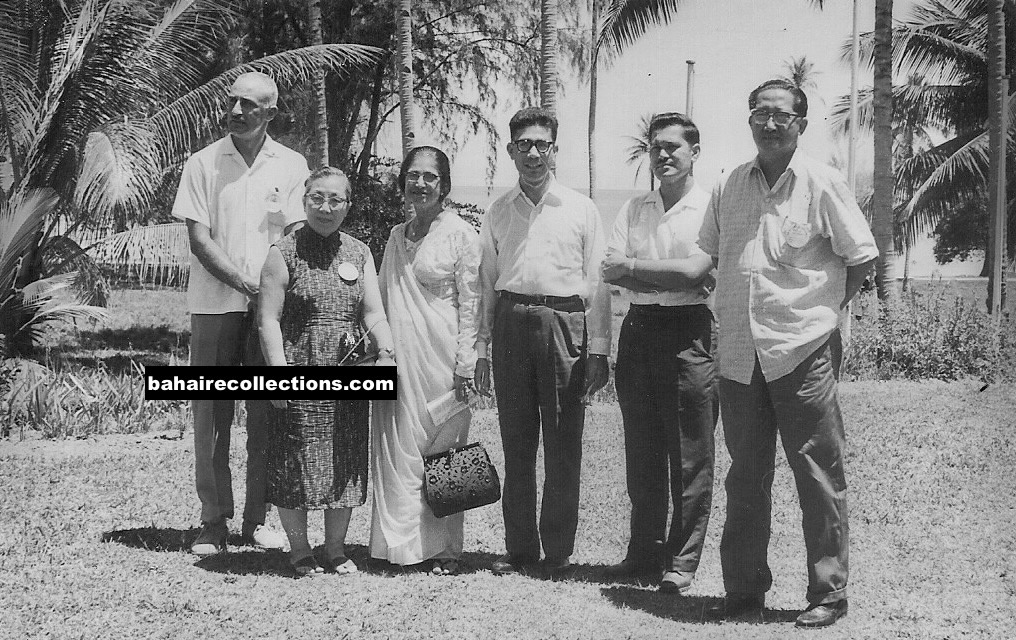
Summer School in Port Dickson, 1961. L-R: Kamran Samimi, Mrs. George Lee, Shirin Fozdar, Dr. John, Jamshed Fozdar, and Leong Tat Chee. While in Brunei Dr. John kept participating in activities in Malaya
Within a year, there was a sizeable Bahá’í community in Sandakan mainly comprising businessmen and their families. A children class was started by Mrs. Grete Fozdar and Miss Annie Tan. Every Sunday afternoon about 20 children would come to their house to have their studies. During weekly firesides Dr. John Fozdar spoke about the Faith in English and Annie Tan would translate into Chinese. On 13 July 1962, the first Local Spiritual Assembly was formed in Sandakan, with the Fozdars serving on this Assembly. Bahá’í Holy days and anniversaries were also celebrated, and many friends and family members were invited for the occasions. The Bahá’í population at that time was around 60. It was the largest Chinese Bahá’í Community in Borneo, and perhaps in the world then too.
Through the efforts of Dr. John, Sandakan also obtained a Bahá’í cemetery. He was audacious and bold in requesting for a cemetery from the authorities. Many months passed and the government did not respond. A Bahá’í engineer, the son of an elderly Bahá’í, Madam Lai, drowned in a stream in1963. With the death of this Bahá’í, Dr. Fozdar approached Ben Stephens (brother of Donald, later Chief Minister of Sabah) who represented the British authorities at that time and the burial ground papers were immediately sorted out. This was the first Bahá’í burial ground in Sabah. It is also interesting to note that the Local Spiritual Assembly of the Bahá’ís of Sandakan was registered with the Registrar of Societies on 19 February 1963. Dr. John’s friend, one Mr. Yu How Chee was instrumental in registering the Sandakan Local Spiritual Assembly.
In Riḍván 1963, Dr. John along with a few other members of the Regional Spiritual Assembly represented this body in the election of the First Universal House of Justice in Haifa. Following the election of the Supreme Body he also attended the first World Congress in London, where he along with other Knights of Bahá’u’lláh were celebrated for arising to fulfil the goals of the Ten Year Crusade.
In October 1964, the family moved to Kuching, Sarawak. The Sandakan community threw a farewell party to the Fozdar family before they left.
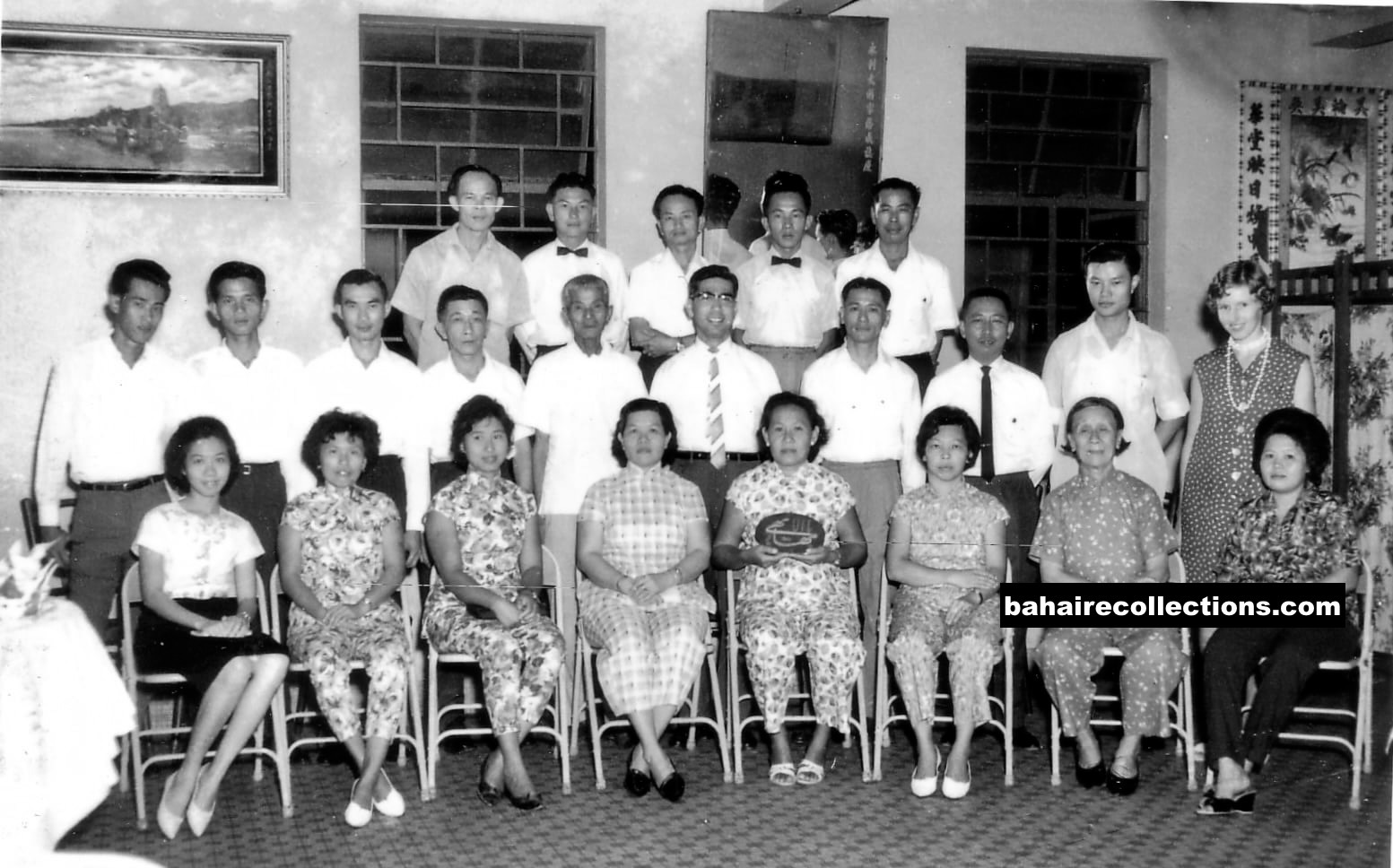
Farewell dinner for Dr. John and Grete, Sandakan, 1964
In Kuching the family played a major role in the progress of the Faith. They first rented two semi-detached shop lots at Mile 2½ Rock Road, Kuching, moving at first into one side of the building which doubled as their home and as the first Bahá’í Centre in Kuching. Rent was cheap, as the buildings were thought to be haunted. Dr. John opened a private clinic, the “Fozdar Clinic”, at the Padungan Garden Arcade on Song Thian Cheok Road, moving after three months to a better location on Khoo Hun Yeang Street in the centre of Kuching, opposite the bus station and directly across the river from Malay kampungs. In addition, Dr. John in 1966 also opened the New Era Nursing and Maternity Home in the semi-detached building adjacent to their home on Rock Road. In 1970 the clinic moved to Jawa Road (now Jalan P. Ramlee), and was renamed Poliklinik. He went into partnership with Dr Si-hoe Kok Wan of Key Clinic, Padungan (the name was changed to Poliklinik). New partners joined over time, including Dr. Chua, Dr. Tan Yaw Kwang and Dr. Nadia Lim. With the coming of the partners Dr John was able to devote more time for the Faith. Dr. John would work long hours for six days in a week and half the day on Sunday. Life was hectic for him and yet he found time to serve.
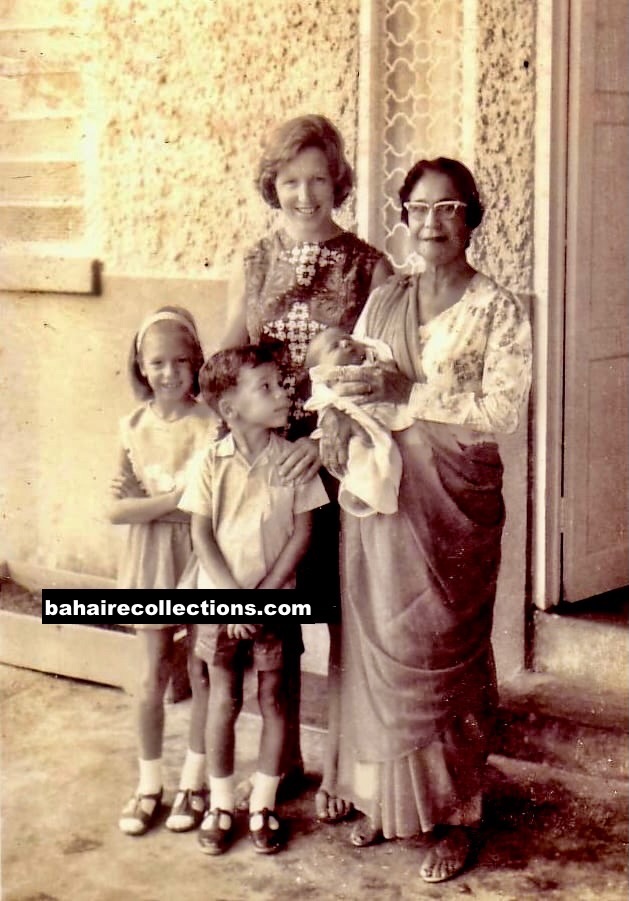
Grete with her children Shirin and Kamal, and mother-in-law Shirin Fozdar holding Ian at 2 1/2 mile Rock Road Kuching in late 1966
With the move to Kuching a new chapter started in their lives and the history of the Faith in Sarawak, and by extension the whole region. His eldest brother Jamshed Fozdar had laid a strong foundation for the Cause in Sarawak in bringing in the first group of believers and established the first Local Spiritual Assembly for Kuching in Riḍván 1953. With Jamshed having gone to Vietnam in 1954 to carry out his services there and in Indochina, the task fell upon John and Grete to take over the building of the nascent community.
In the intervening time between Jamshed Fozdar and family departure and the arrival of Dr John Fozdar and family, several pioneers arrived from overseas to support the young Bahá’í community of Kuching. From India Mr. Lele, from the United States Miss. Marjorie Lighthall (via Laos, later married Minoo Fozdar in Brunei), Doree Thomas, Earl Mock, among others, while others from Malaya and Brunei came to travel teach. Other towns like Kanowit, Kapit and Sibu were opened to the Faith by Bahá’ís from Kuching visiting relatives or being transferred in their job.
By the time Dr. John and family arrived in Kuching there were already Local Spiritual Assemblies in Kanowit, Kapit and Sibu apart from Kuching. All early pioneers and travel teachers from other countries had left, leaving only Harlan Lang from the United States who had arrived in February of 1964. The Kuching Community had changed little since the time Jamshed Fozdar and family left, but the Local Assembly was regularly elected every year. Harlan Lang and his wife Chiang Kim Ling from West Malaysia were very active members of the Kuching Community until they left in 1965 to pioneer to one of the Pacific Islands.
But there were also many more Bahá’ís in Sarawak, far from the city and deep in the interior, in longhouses along the Sungai Gaat (Gaat River, a tributary of the Baleh and Rejang rivers). The Faith had been introduced there by local men who had accepted the Faith when working in Brunei, before returning home. Yankee Leong and M. Maniam (from West Malaysia) and Abolfazl Bijan Bayzaee (a travel teacher from Iran) had travelled there in 1963, at the request of the Regional Assembly of South East Asia, to meet with, deepen and consolidate believers here, with Maniam and Bayzaee staying for 9 months. However, by the time of the Fozdars arrival in Sarawak, all the travel teachers had left. The only contact was by post through Minoo and Marjorie from Brunei with some members of the Local Spiritual Assemblies of Kuching and Kapit and a local travel teacher stationed in Kapit by the name of Lalok ak Lian, with little supervision and coordination possible.
When Dr. John’s family moved to Sarawak, the Faith was clearly still in an early stage of its development, and he was conscious of meeting the goals of the Nine Year Plan. He was the only member of the National Spiritual Assembly of Malaysia residing in the vast area of East Malaysia in the 1960s and had shouldered heavy responsibilities to ensure the development of the Faith there. His appeal to the community in West Malaysia was published in the Nineteen Day Feast newsletter of the month of Ilm (Knowledge) in December 1966.
The opportunities for teaching and consolidation may not be available much longer. This thought grieves me a lot, because it is so easy to win the goals of the Plan if only we had a few travelling teachers. If there are capable young Bahá’í teachers in Malaya, we would like them to come and help us.
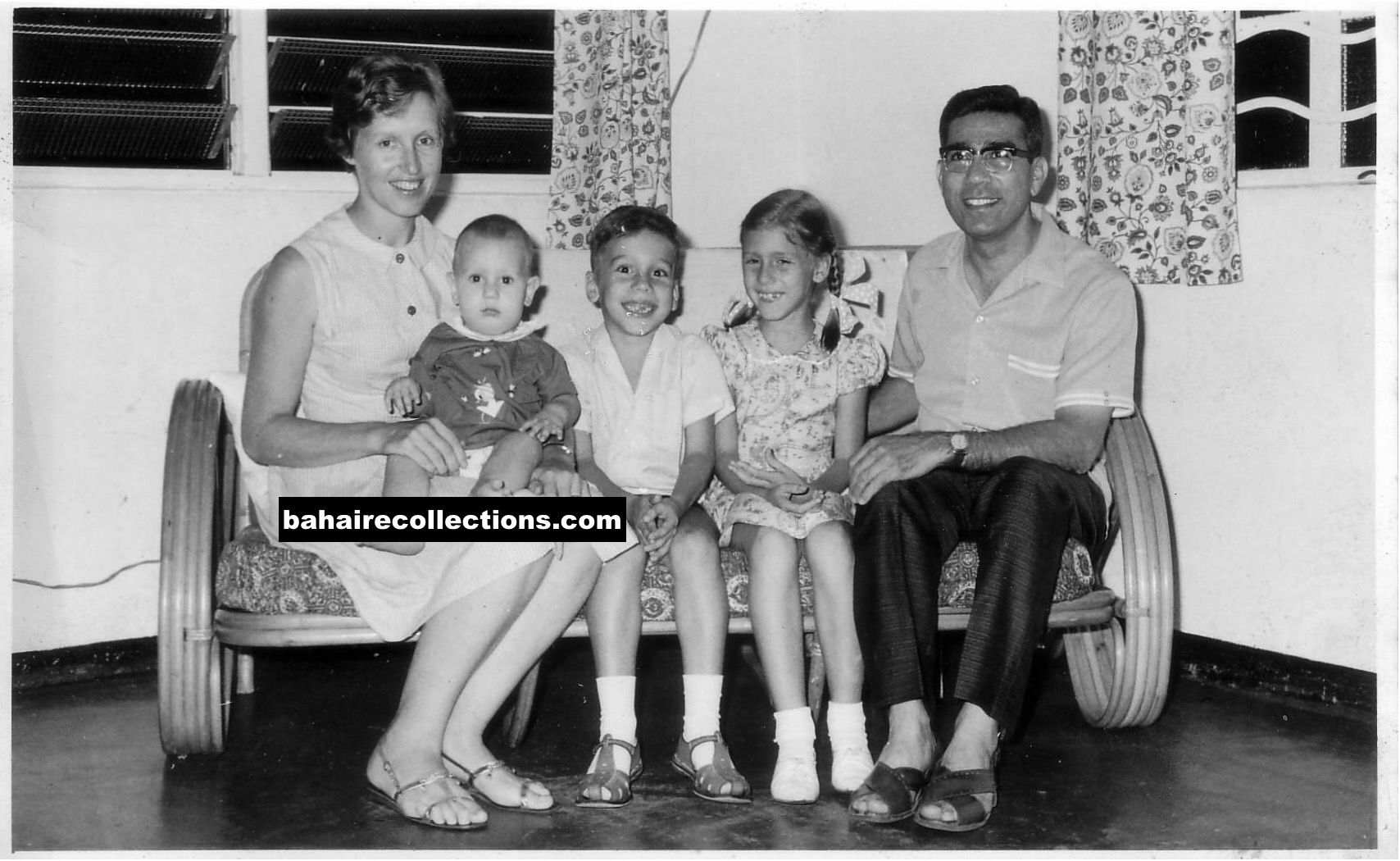
Settling down in Kuching in 1967. L-R: Grete with Ian on her lap, Kamal, Shirin and Dr. John
In 1967 Maniam returned and settled after an absence of 4 years in West Malaysia, concentrating on revitalising communities in central Sarawak, particularly Sungai Gaat. And from 1968 many more believers from West Malaysia started coming to Sarawak for travel teaching, or on transfer with their work. There was a very run-down and written-off building on 9 Rodway Road, belonging to the Chartered Bank, which was standing vacant. Since Dr. John was doing well in his practice, the bank gave him a loan and this spacious property was bought. This iconic building remains the house where many historical events took place. The new Bahá’í Centre became a centre of activity, as it was easily accessible, and the believers could meet and organise themselves for activities.
In 1970 Bahá’í firesides were started at the Rodway Road home, commencing each Wednesday at 8 pm. They were always popular and well attended, and the youth often brought their friends. Grete was responsible for music, devotionals and particularly refreshments. During conversations after formal meetings, some friends would gather around him because he always knew and talked about things which were important, interesting and new to them.
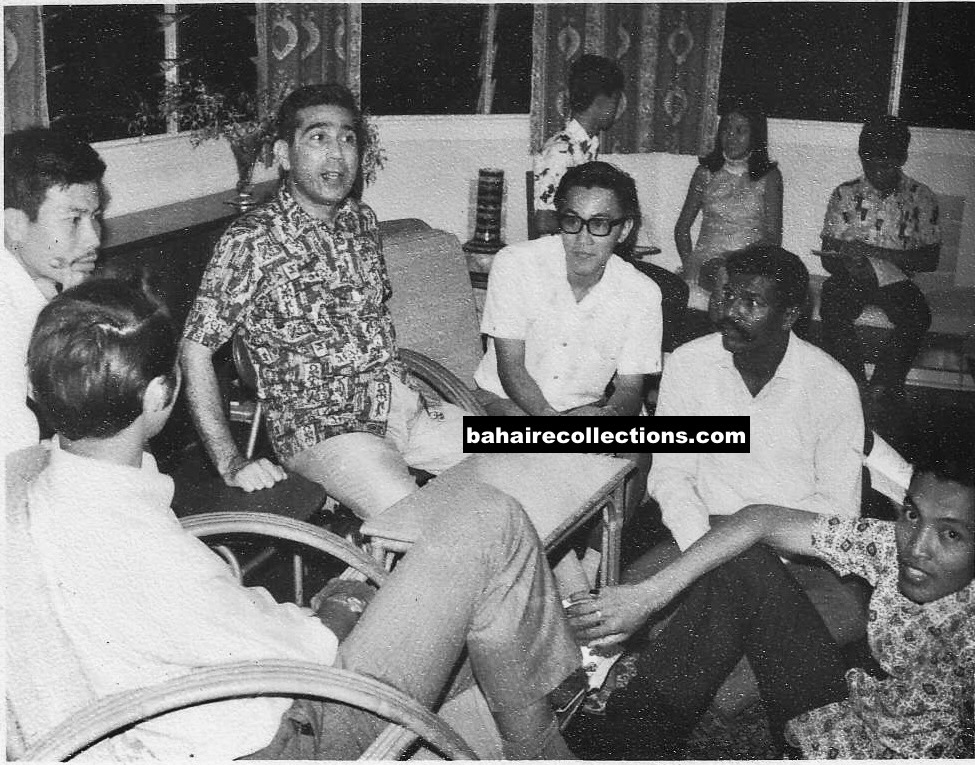
Discussions with Dr. John. On the floor is Flight Captain Choo Yeok Boon with Commando Arumugam to his right. First on the sofa on the left facing Dr. John is Matthews Wagner, a new believer
When 9-Day Institute was introduced by Mr. Jenabe Caldwell, the house was also in demand because of the big garden and large floor space being able to accommodate all who did not mind roughing it a bit. The home accommodated numerous travel teachers, pioneers, and visitors who usually stayed for a few days before going to their respective destinations.
Dr. John became a towering figure, and the days were filled with landmark events and milestones for the Cause. The fifty eight years of Dr. John’s stay in Sarawak were filled with restless activities for the Cause in diverse ways. For example, from 1969 Radio Sarawak, a branch of Radio Malaysia, even started broadcasting regular Bahá’í programs in a slot that was meant for various religions. It was Dr. John who hosted, every 5 weeks, and until the mid-1980s, this half hour Bahá’í broadcast on that radio station. And it was the work of Dr. John in getting this started, with listeners gaining much authentic and first-hand information on the Faith.
When the first National Spiritual Assembly of Malaysia comprising Peninsula Malaysia, Singapore, Sabah, Sarawak and Brunei with its seat in Kuala Lumpur was elected in 1964, Dr. John, Grete Fozdar, Minoo Fozdar and Mrs. Marjorie Fozdar were all elected to this body, with Dr. John elected as its Chairman. He served on this National Spiritual Assembly continuously until 1972 when two separate National Spiritual Assemblies were elected – one for West Malaysia and the other for East Malaysia, consisting of Sabah and Sarawak and Brunei. Dr John was elected to serve in the latter that existed for the 1972 and 1973. But in 1974 the National Spiritual Assembly of East Malaysia and Brunei was dissolved, Consequently, Sabah, Sarawak and West Malaysia had one National Spiritual Assembly, called the Spiritual Assembly of the Bahá’ís of Malaysia. Dr. John left this national institution in 1980 when the Universal House of Justice appointed him to the Continental Board of Counsellors. He served in the new capacity from 26 November 1980 to 26 November 1995.
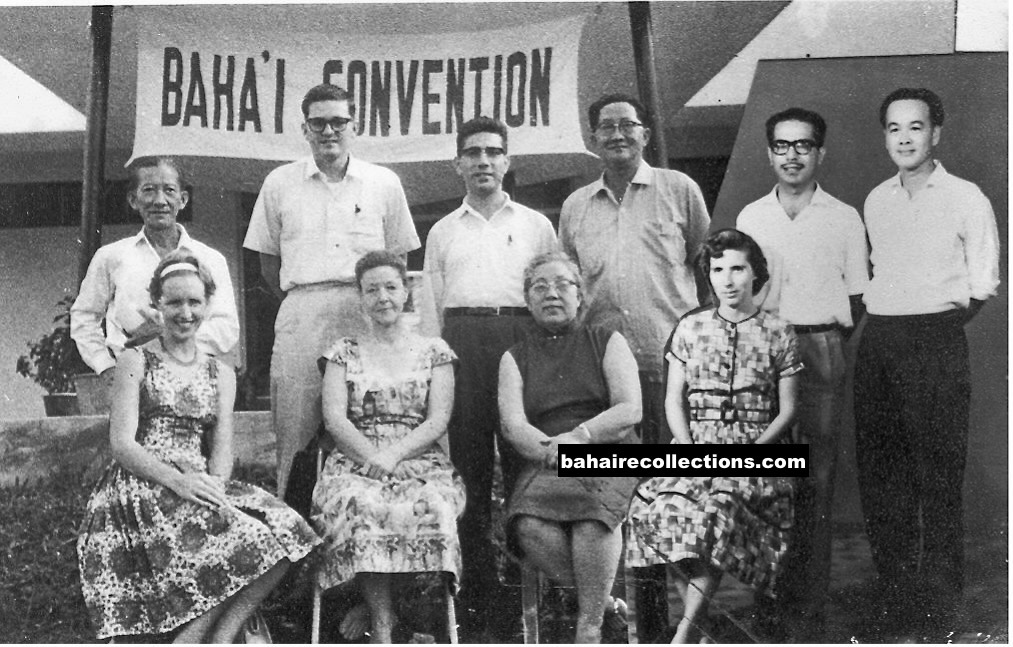
First National Spiritual Assembly of Malaysia, 1964. Seated L-R: Grete, Amatu’l-Bahá Rúhíyyih Khánum, representing the Supreme Body, Mrs. George Lee and Marjorie Minoo. Standing L-R: Yankee Leong, Harlan Lang, Dr. John, Leong Tat Chee, Minoo and Chin Yun Sang
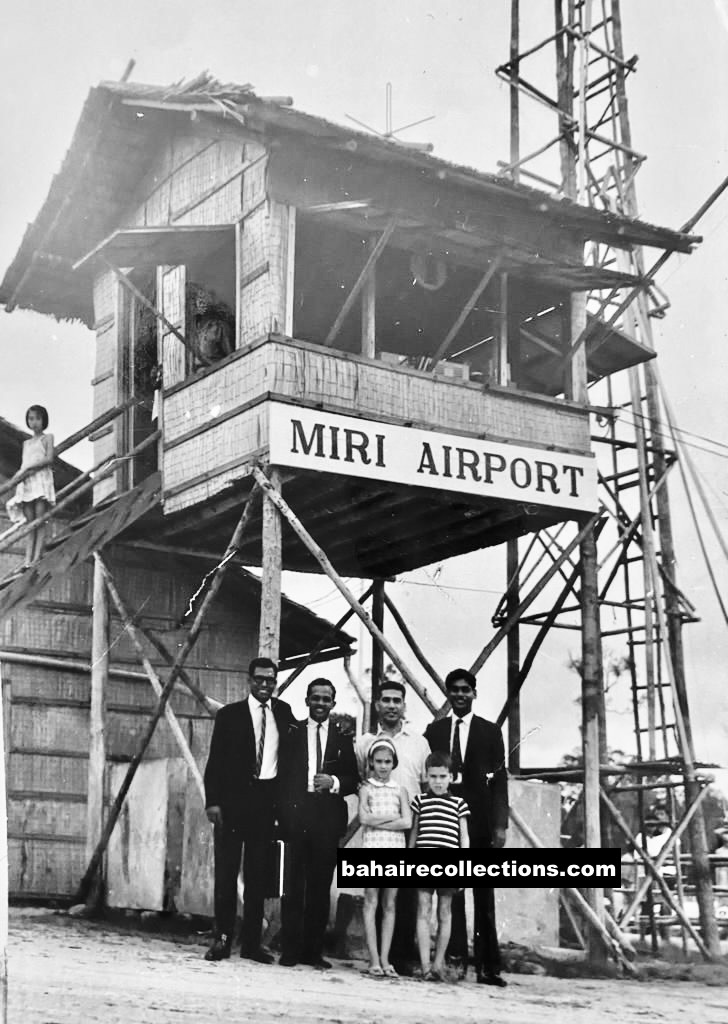
Visit by members of the National Spiritual Assembly of Malaysia to East Malaysia, December 1968. Standing L-R at Miri Airport: Inbum Chinniah, Tony Fernandez, Dr. John Fozdar and S. Nagaratnam. The two children L-R: Shirin and Kamal
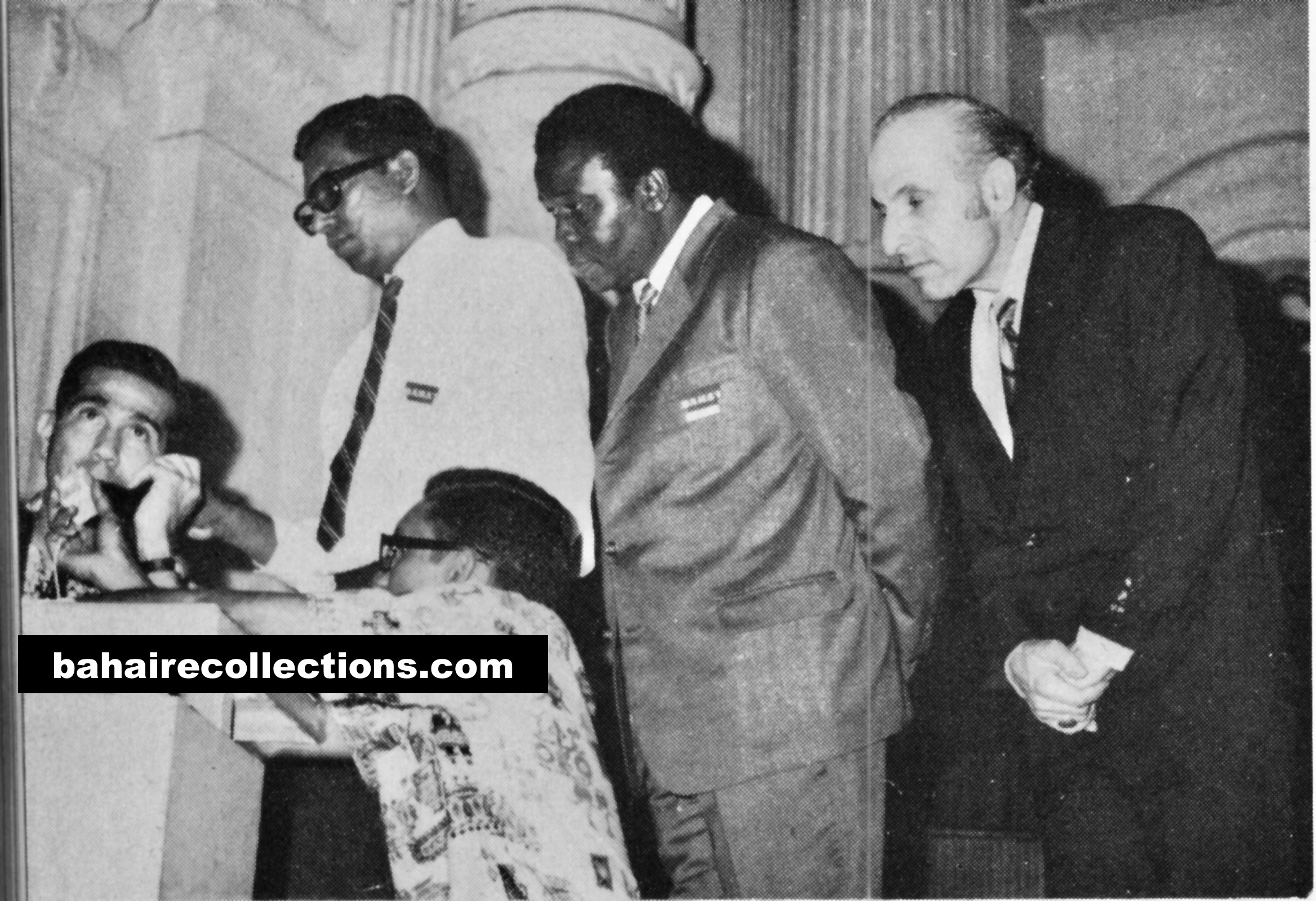
Oceanic Conference of the South China Seas, Singapore 1971. Dr. John conversing with Amatu’l-Bahá Rúhíyyih Khánum at a similar conference in Monrovia. To his left are S. Ravichandran assisting in the connection, Inbum Chinniah, Hand of the Cause of God Enoch Olinga and Counsellor Momtazi from Japan
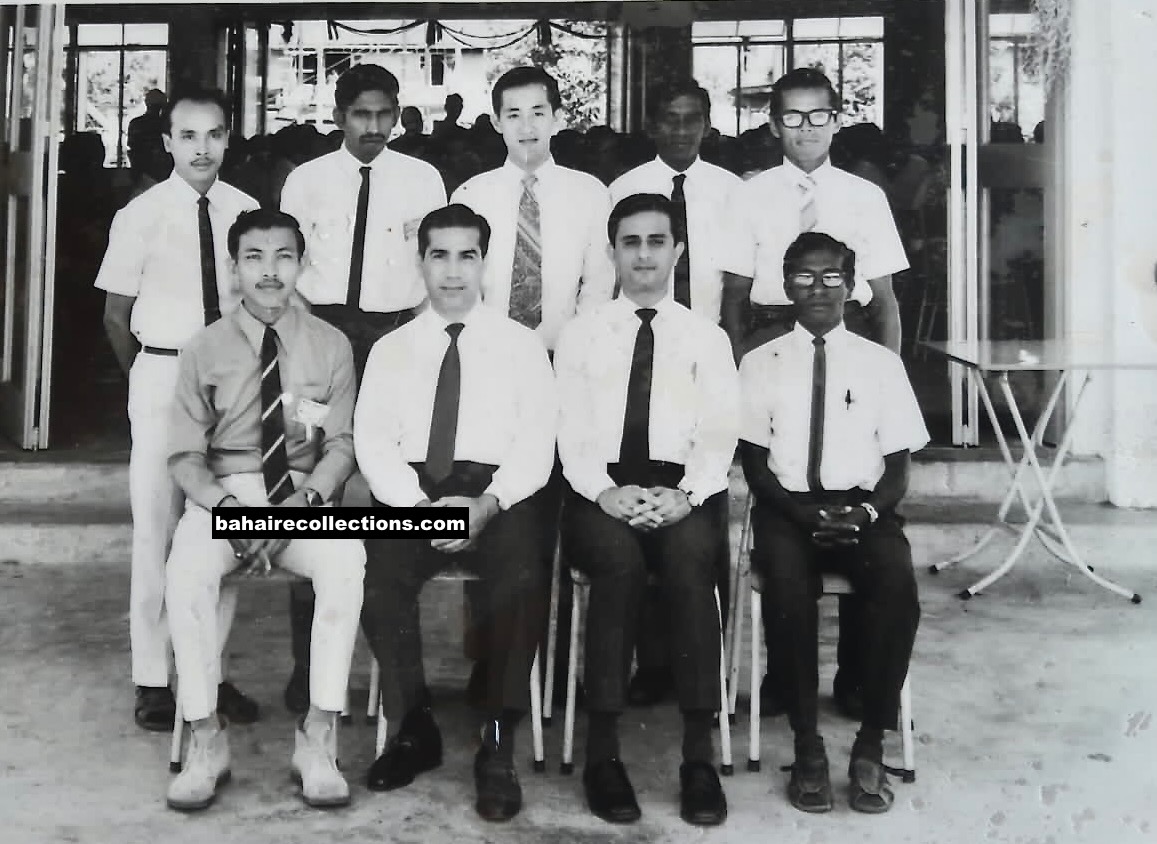
First National Spiritual Assembly of East Malaysia and Brunei. 1972. Seated L-R: Choo Yeok Boon, Dr. John, Rusi Irani, M. Maniam. Standing L-R: Ragai Lang, P. Thinathayallam, Lim Boon Huat, G. Kuppusamy and Sapong Andar
He was well respected as a Counsellor, and it was inspiring to listen to his talks at gatherings, especially at conventions, where he spoke with the clarity and eloquence that came naturally to him. As a Counsellor he participated in the national conventions of neighbouring countries and also was the representative of the community at the 41st Session of the Economic and Social Commission for Asia and the Pacific (ESCAP), held in Bangkok, from 19-29 March 1985. On being relieved from the Continental Board of Counsellors, Dr. John served on the Spiritual Assembly of the Bahá’ís of Sarawak from 1998 to 2005.
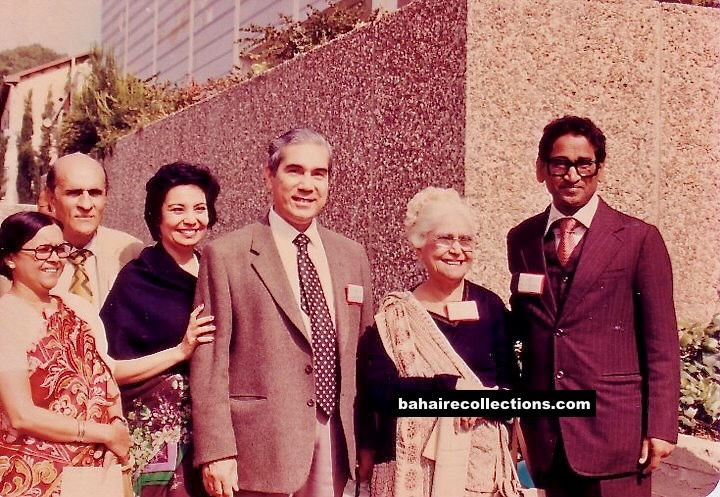
International Convention in Haifa, 1983. L-R: Mrs. Bharthi Gandhi, Khodadad Vajdi, Zena Sorabjee, Counsellor Dr. John, Shirin Fozdar and Dr. Jagdish Gandhi
Tribute by Counsellor Dr. John at the memorial service for Yankee Leong held in Ipoh, Perak, June 1986
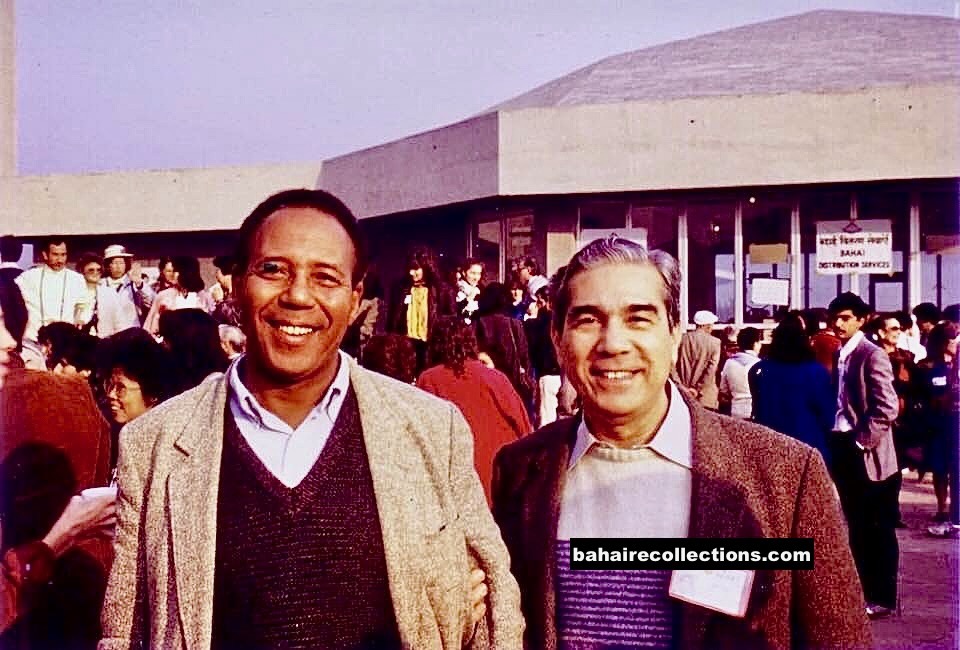
Knights of Bahá’u’lláh Charles Duncan and Dr. John meet at the inauguration of the Bahá’í House of Worship in New Delhi, India, December 1986
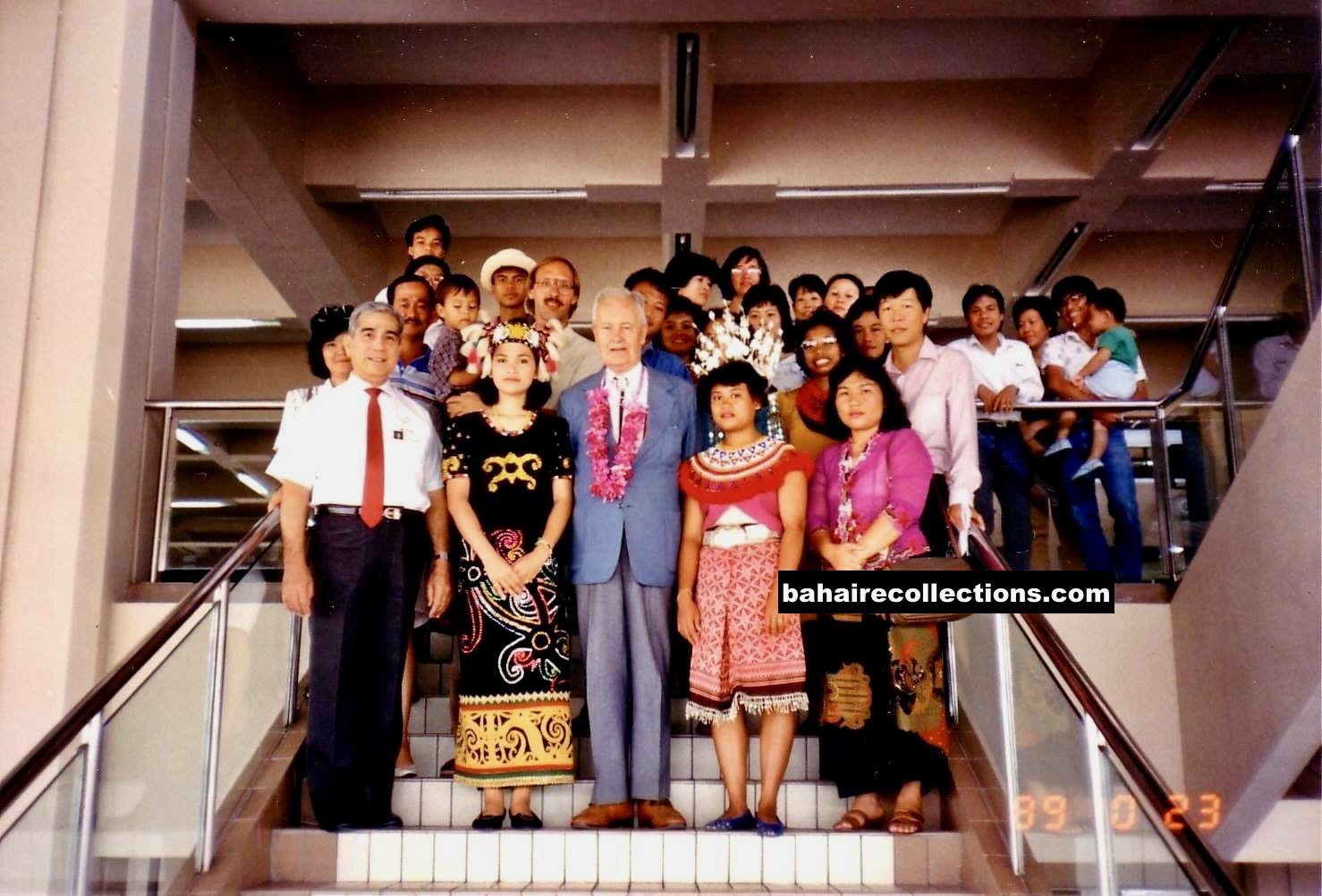 Welcoming the arrival of Mr. David Hofman in Kuching, Sarawak, 1989. He was the first retired member of the Supreme Body to visit Sarawak
Welcoming the arrival of Mr. David Hofman in Kuching, Sarawak, 1989. He was the first retired member of the Supreme Body to visit Sarawak
He also served as a Deputy Trustee of Ḥuqúqu’lláh from 1987 to 2011 during which period he organised several training sessions in the region for his assistants and other workers under this institution.
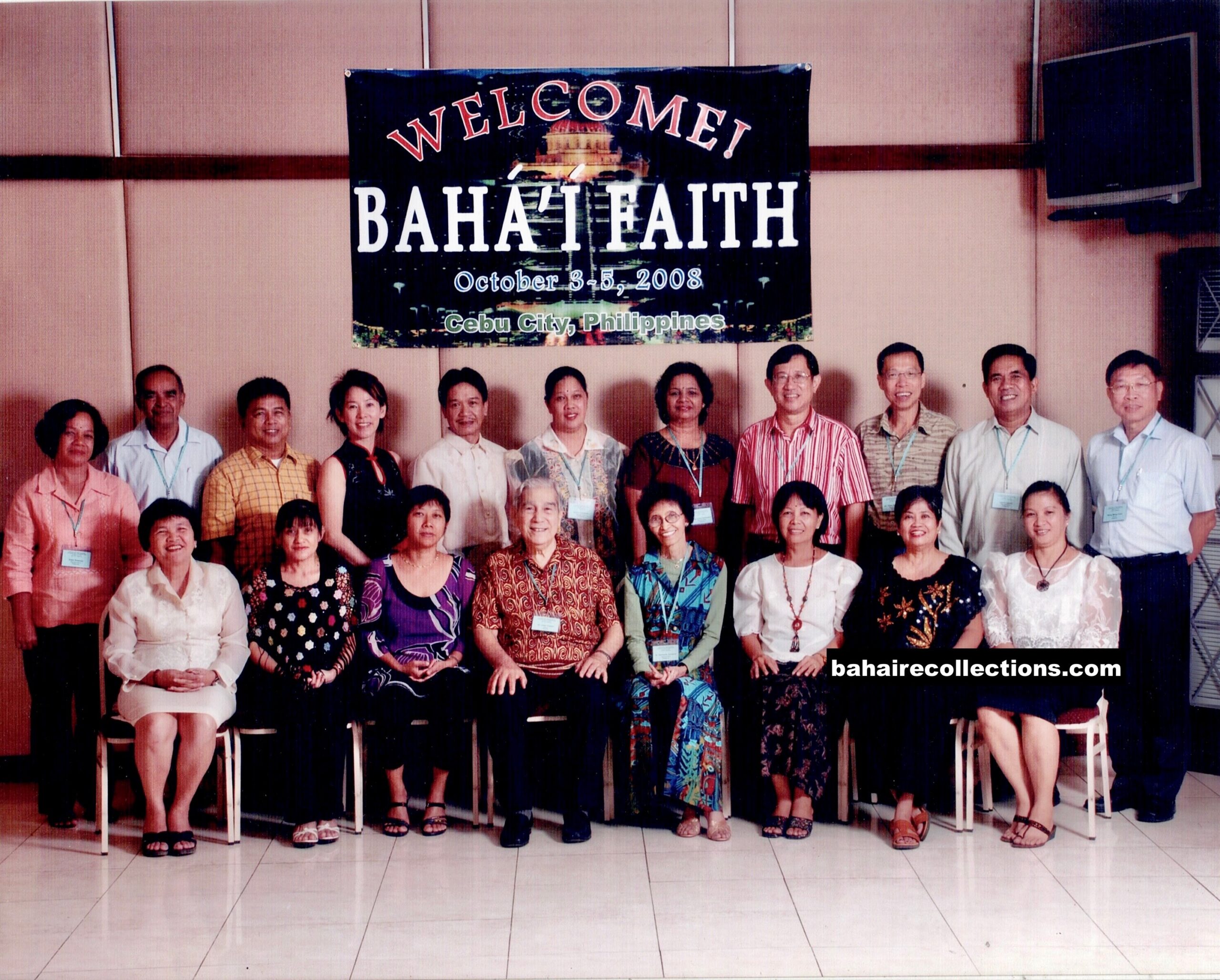
Dr. John Fozdar with Deputy Trustees and representatives from Indonesia, Malaysia, Philippines, Sarawak and Singapore at Ḥuqúqu’lláh Conference in Cebu City, Philippines, 2008. (Photo courtesy: Wong Meng Fook, Singapore)
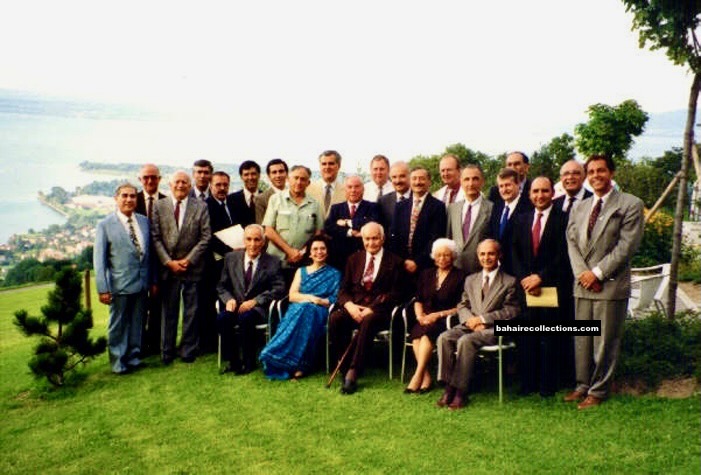
Huqúqu’lláh Conference at Landegg Academy, Switzerland, August 1991. Dr. John is standing at extreme left, while his sister Zena Sorabjee, also a Counsellor at this time is seated next to Hand of the Cause of God Dr. ‘Ali-Muhammad Varqá, Chief Trustee of Huqúqu’lláh
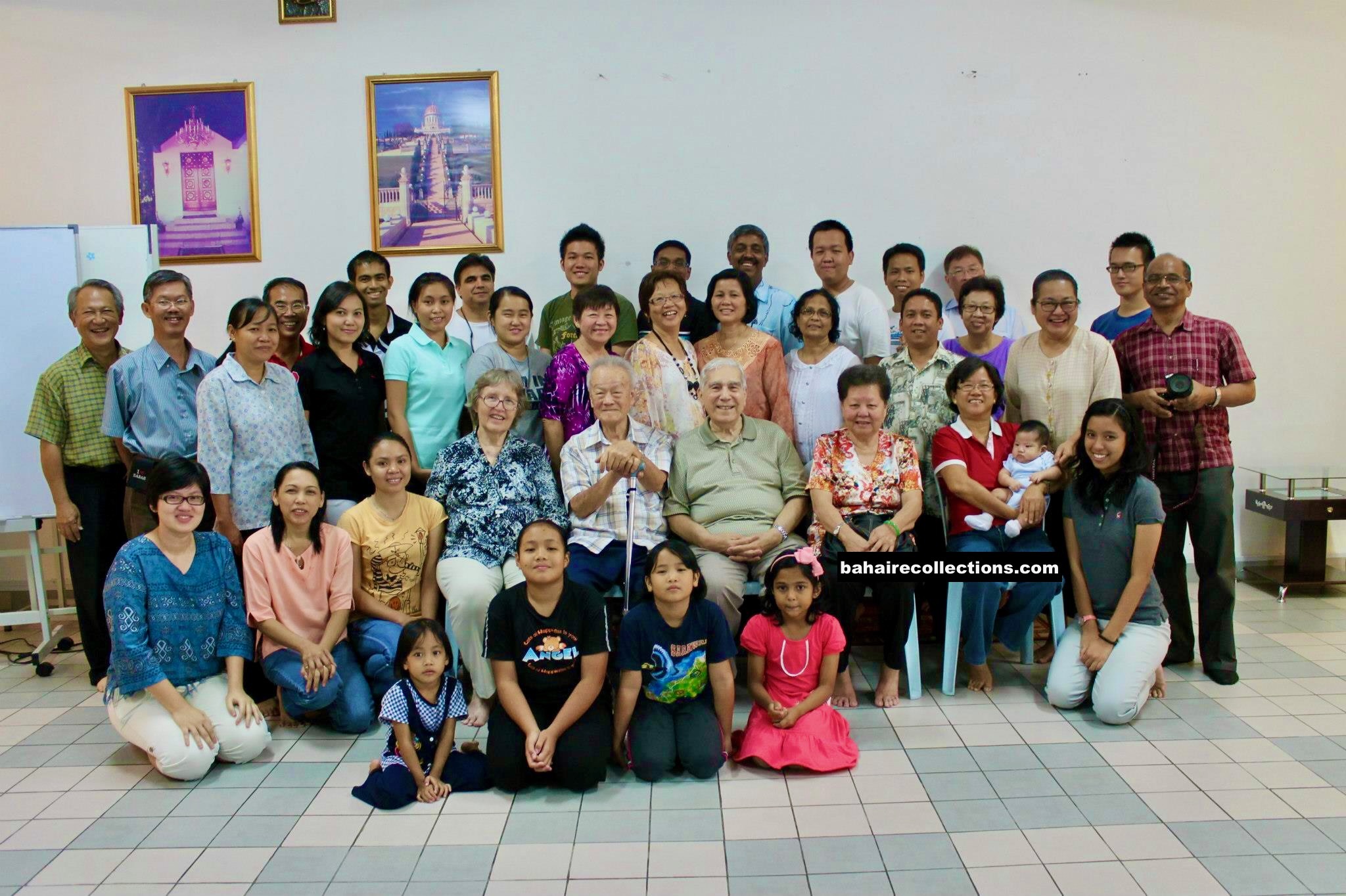 A fellowship gathering on Sunday, 2 September, 2012 with some believers from Brunei, Sabah and Sarawak at Kota Kinabalu. Seated L-R: Grete, Chin Yun Sang of Brunei, Dr. John, Madam Mary Teo (wife of Chin Yun Sang) and Doris Ang
A fellowship gathering on Sunday, 2 September, 2012 with some believers from Brunei, Sabah and Sarawak at Kota Kinabalu. Seated L-R: Grete, Chin Yun Sang of Brunei, Dr. John, Madam Mary Teo (wife of Chin Yun Sang) and Doris Ang
Even while serving on the National Spiritual Assembly of Malaysia till 1972, Dr. John was called upon to serve in various capacities. He was on the Editorial Board of the Malaysian Bahá’í News magazine, the official newsletter of the National Spiritual Assembly of the Bahá’ís of Malaysia, which had Mrs. Shantha Sundram as the chief editor. The Proclamation Committee was appointed at the first meeting of the National Spiritual Assembly in 1966 to address the need for proclaiming the Faith on a grander scale – Dr. John was appointed to serve on this Committee. With the publishing of local Bahá’í materials in the English language increasing in the late 1970s, the National Spiritual Assembly appointed an English Reviewing Committee in 1970 with Dr. John Fozdar as one of the members. With the launching of the Five-Year Period for Proclamation in Malaysia (1967-1973), there was a need to set up some form of a Bahá’í Information Service and Dr. John was appointed on the Sarawak State Information Office. Although living in Sarawak, he was always available to visit West Malaysia whenever there was a call for him to be a speaker at the Bahá’í gatherings, and especially at summer and winter schools. The audience would always be captivated to listen to his talks, which carried much information born of intense research and avid reading.
He was very highly successful in propagating the Faith to the highest levels in Brunei, Sabah and later in Sarawak. He was involved in each stage of the development of the Faith in this part of the world. He himself was a majestic personality, an eloquent speaker, and was chairman at many Bahá’í conferences of great magnitude. He carried himself well and in style, especially when the Faith’s image was involved. One of his great achievements was to enhance and maintain the good image of the Faith among those in the highest authority both in the political arena and with non-governmental organizations in Sarawak where he successfully promoted the tenets of the Faith in serving humanity. His active involvement in non-governmental organizations started in 1966, when he was the eleventh President of the Junior Chamber of Commerce (“Jaycees”) in Sarawak and awarded the JCI Senatorship Award, the organisation’s most prestigious award in Sarawak, and conferred a life membership in the Sarawak Chapter and Junior Chamber International. He was awarded the same award when, in 1971, he became the twenty fourth President. The Junior Chamber of Commerce is a non-profit, leadership development organization comprised of people representing diverse occupations, interests, and social and economic levels, who are drawn together by the desire for self-improvement and community involvement. Dr. John was a natural fit in this organisation, in which he led the way.
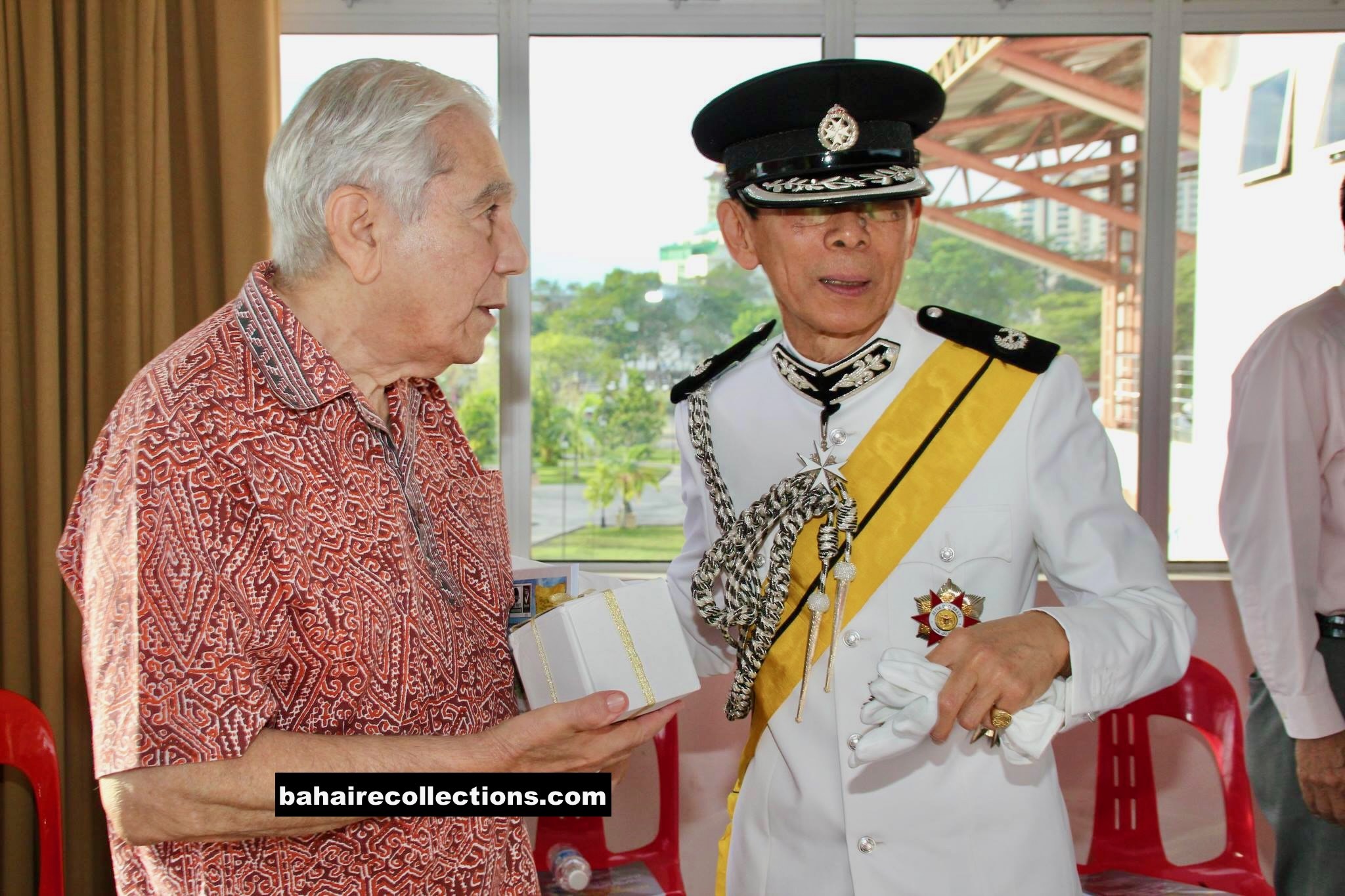 Dr. John with Datuk Seri Ang Lai Soon at the annual march past of the St. Johns Ambulance Sarawak, 2013
Dr. John with Datuk Seri Ang Lai Soon at the annual march past of the St. Johns Ambulance Sarawak, 2013
He was a founding member of several humanitarian associations. In 1981 when the Sarawak school for children with special needs was opened on Ong Tiang Swee Road in Kuching, Dr. John had played a leading role in its creation, through his role on the Social Welfare Council. He was actively involved in the Red Crescent, the Sarawak Cheshire Home (for which he also was in-charge of the website), Social Welfare Council, Society for the Blind, and the Leprosy Association. In his later years, especially when he ceased serving on the Spiritual Assembly of the Bahá’ís of Sarawak, he was actively involved in promotion of inter-Faith understanding through the Malaysian Inter-Faith Network where, as its Chairman, his role stood out in promoting harmony and fellowship among the followers of different faiths. He was sure to be invited for annual festivals of other faiths. He also was an active participant in the Harmony Walk 2017 held at the premises of the Islamic Complex in Kuching – a five kilometer walk that was participated by the Sarawak Sikh Temple, Tua Pek Kong, Kuil Sri Srinivasagar Kaliamman, St. Thomas Church and St. Joseph Church. Leaders of other religious faiths had a special respect and liking for him. Despite his busy schedule, Dr. Fozdar attended coffee-talk sessions at the Sarawak Club where members were eager to seek his company. He would converse with ease on a range of subjects, as he was an avid reader and kept abreast with world events. He always conversed with wit and cheerfulness, and the members loved his company as it would enhance their spirit. Dr. John was actively involved in such humanitarian organisations till his last days, and age, although a constraint, was never a barrier. Even in his last days, when he had to use walking stick to move around, he still attended the Muslim festival of Eid al-Fitr (Hari Raya Puasa) at the Islamic Information Centre in Kuching, and the investiture of the Anglican Bishop for Brunei.
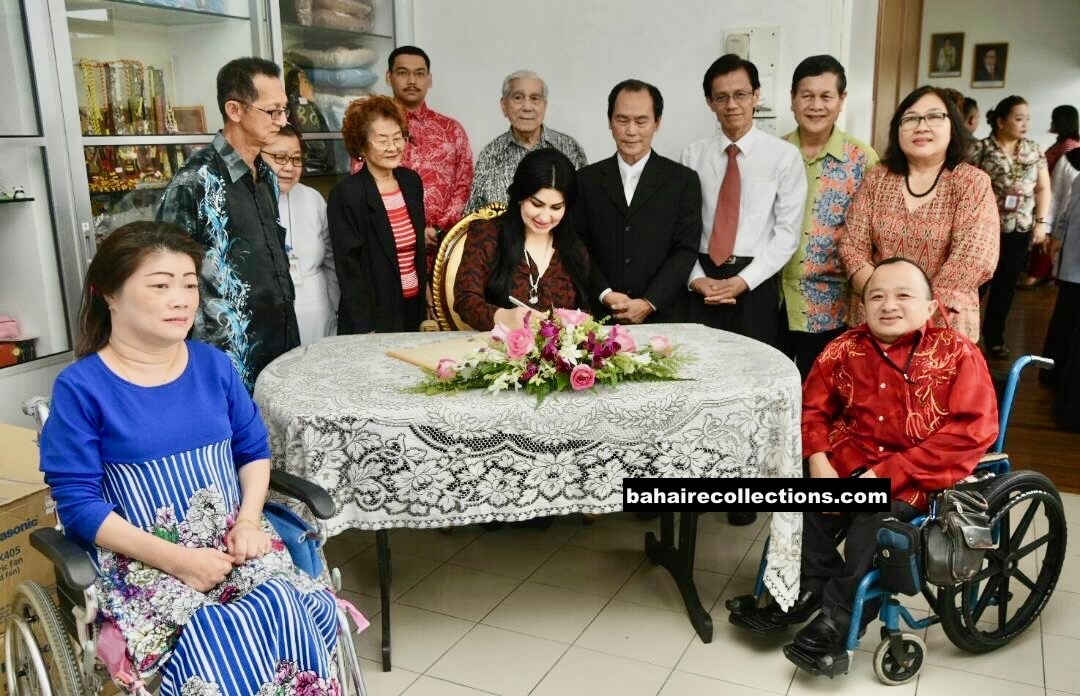
At the visit by Yang Amat Berbahagia Toh Puan Datuk Patinggi Hajjah Raghad Kurdi Taib to Cheshire Home, March 2018
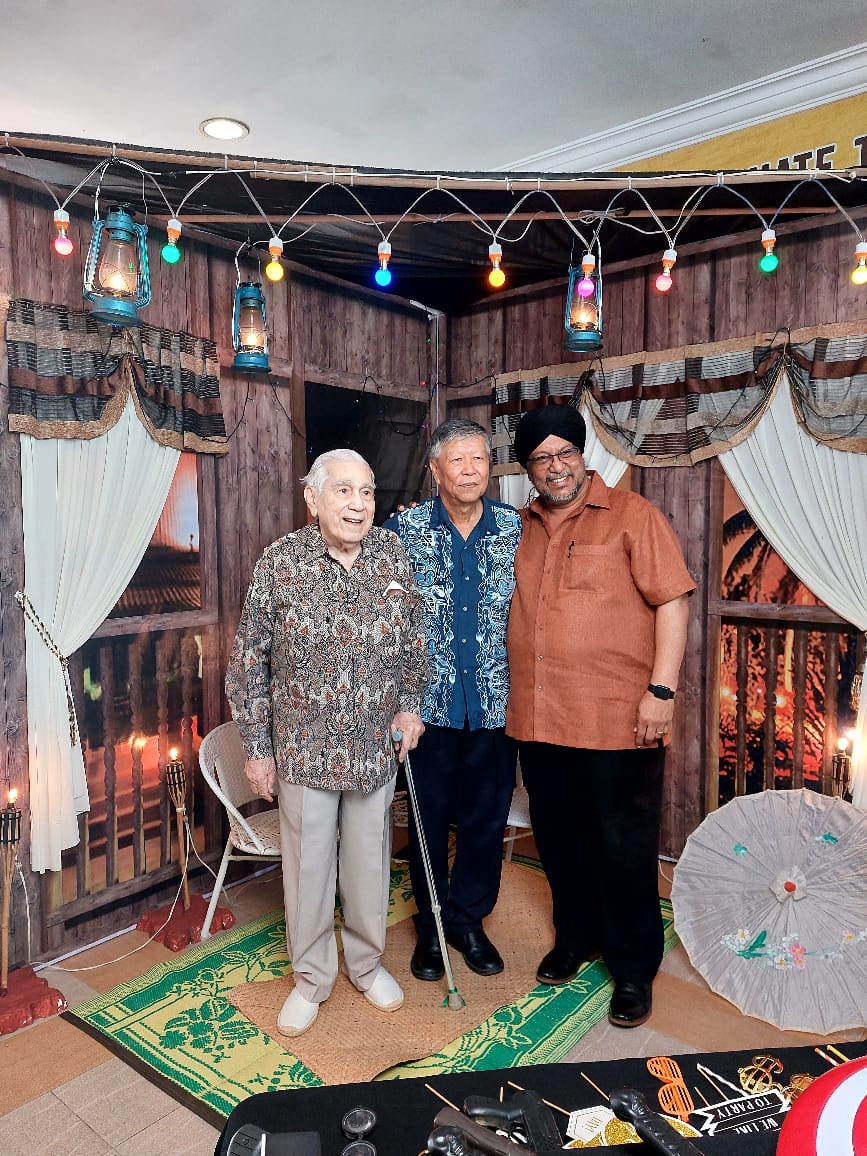
At the Hari Raya Puasa celebrations at the Islamic Information Centre with Chin Chia Chau and Dr. Kalwinder Singh Khaira, President of Sikh Temple, Kuching, 2022
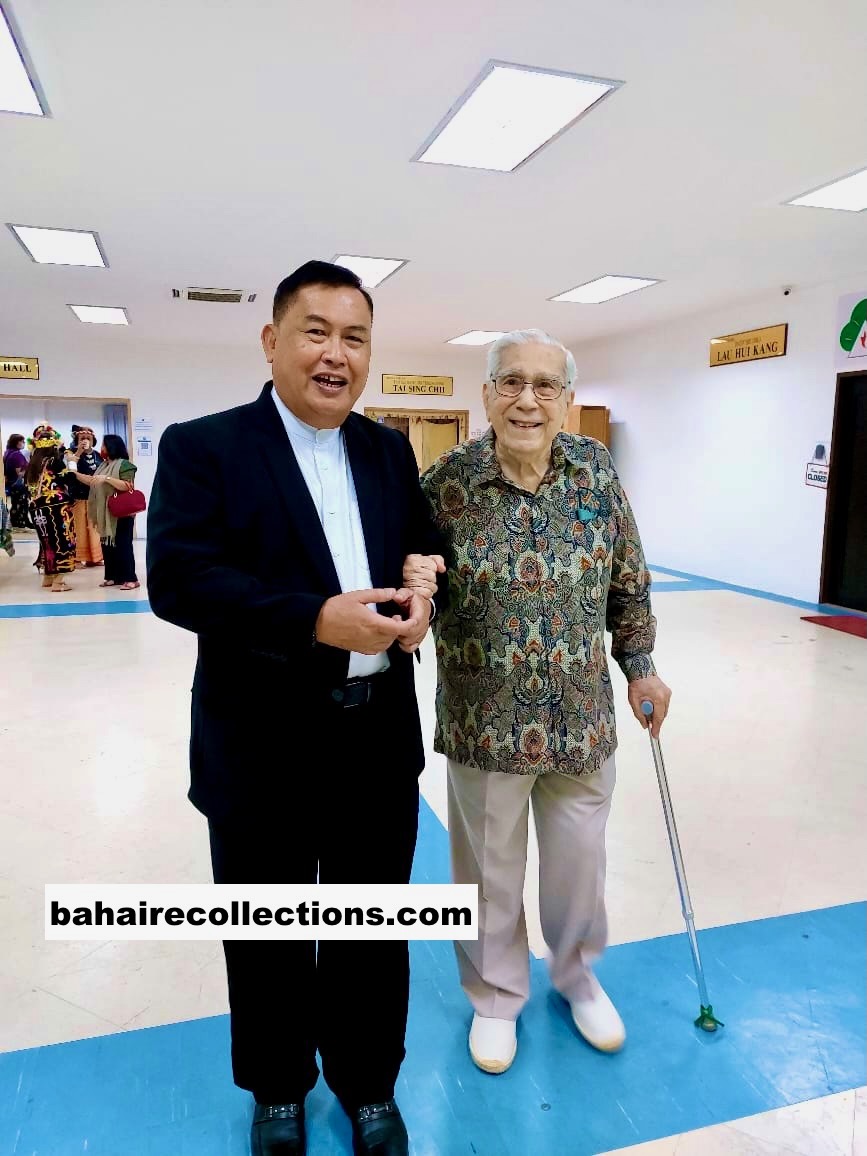
With Mr. Ambrose Linang, Head of All Churches in Sarawak, 2022
Another highly successful area of service was the recognition he got for the Faith in government circles, including getting the Bahá’í Naw-Ruz festival included in the Sarawak Government Gazette. At every opportunity Dr. John did not fail to present the Faith to those highest in authority. He was the leading believer in acquainting those in authority with the tenets of the Faith through uncountable courtesy calls throughout his years in Sarawak. Of great importance among others was his leading a delegation for presenting the book “Proclamation of Baha’u’llah to the Kings” in October 1970 to the Deputy Chief Minister Mr. Stephen Yong, the speaker of Council Negeri Sarawak, Senator William Tan and Mr. Song Thian Cheok, the Mayor of Kuching town. These visits were well mentioned in the midday news of over Radio Sarawak and well covered in the Sarawak Tribune. When the Hand of the Cause Mr. Collis Featherstone and his wife visited Kuching in 1983, Dr. John took him to pay courtesy calls upon high ranking government officials including Dato Sri Celestine Ujang anak Jilan, Speaker of the Sarawak State Legislative Assembly and Datuk Amar Sim Kheng Hong, Deputy Chief Minister of Sarawak, bringing much press publicity for the Faith. In 1984, a delegation led by Counsellor Dr. John paid a courtesy call upon Datuk Sulaiman Daud, the Federal Minister of Education. In 1986, Dr. John played a key role in the presentation of the Promise for World Peace statement to prominent people in Sarawak including the Governor, Tun Datuk Patinggi (Dr.) Haji Ahmad Zaidi Adruce bin Muhammed Noor. He wrote, as a Counsellor then, to individuals and institutions in Sarawak to present the statement to as many prominent people as possible. Dr. John also spoke as the Bahá’í representative at the high-level World Peace Conference organised by the Spiritual Assembly of the Bahá’ís of Malaysia at the Jaya Puri Hotel in Petaling Jaya in January 1986. And on the occasion of the hundredth anniversary of the passing of Bahá’u’lláh in 1992, Counsellor Dr. John accompanied by two members of the Local Spiritual Assembly of Kuching – Mr. Chin Chia Chau and Mr. Dajai Mancha presented the statement on Bahá’u’lláh to Datuk Amar Dr. Wong Soon Kai which was reported in the Sarawak Tribune dated 15 October 1992. In 2014 he also paid a courtesy call upon the Chief Minister of Sabah.
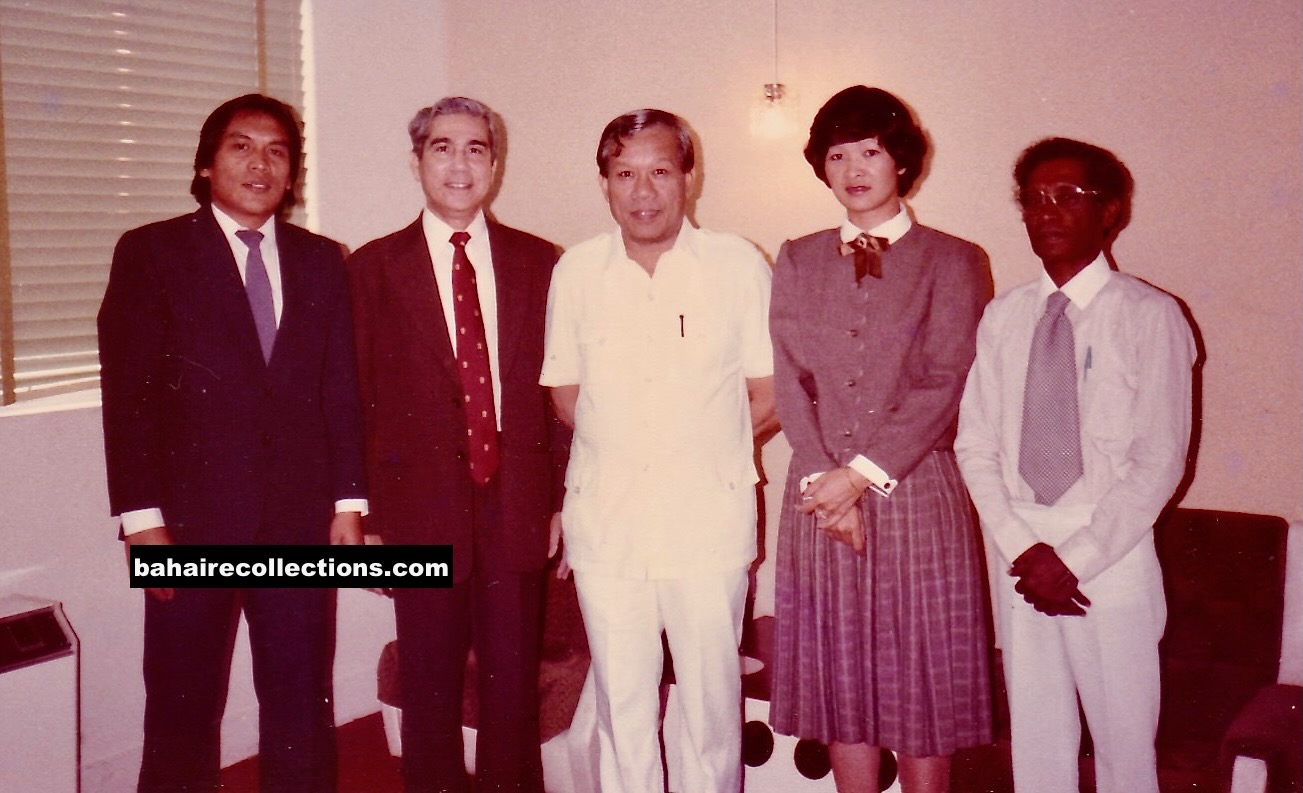
Courtesy call on the Federal Education Minister Datuk Dr. Sulaiman Daud. L-R: Dajai Mancha, Dr. John, Datuk Sulaiman Daud, Winnie Hii Hui Chee and M. Maniam
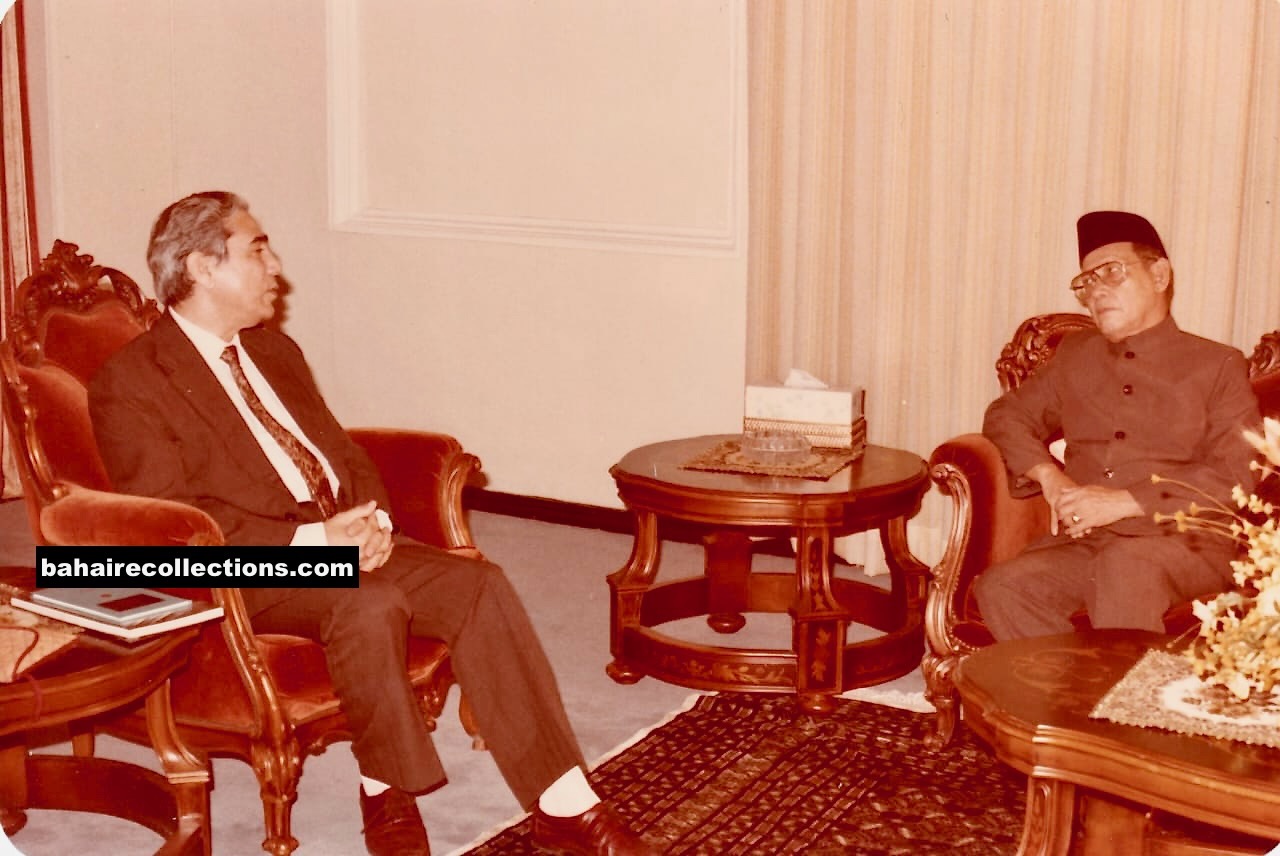
Counsellor Dr. John presenting the Peace Statement to Datuk Patinggi Hj. Ahmad Zaidi Adruce Bin Mohd Noor, Governor of Sarawak, 1986
Even within the first decade of his stay in Sarawak Dr. John was well recognised in the topmost circles. In 1972 he was awarded the Ahli Bintang Sarawak (ABS) by the Governor of Sarawak on the occasion of the Governor’s birthday. He felt uncomfortable in receiving awards and declined subsequent ones offered. His forging of close contacts with prominent people assisted not only for the propagation of the Faith, but also for protection as well. Dr. John was, by nature, warm-hearted among the believers but was also a strict disciplinarian to ensure the tenets of the Faith were adhered-to and would never entertain any deviation from the straight path, the kind of path that he himself strived to follow. It could be said that he, along with his wife, were the front runners in bringing the Faith out of obscurity in the early days. They developed the early believers and nurtured the community too into maturity. He was highly influential in protecting the Faith and averting possible opposition through his contacts with those in authority.
There is still one more area of service to the humanity where Dr. John shall be remembered, especially the downtrodden in life. He was a panel doctor of the Borneo Company and several others, and yet his concern was much for the poor. He established his polyclinic which, other than providing his own livelihood, also looked after those poor patients who had no financial means to visit doctors. His charges were minimal for them, and many a patient received free treatment. This Dr. John did out of his genuine love for humanity. For this and other humanitarian services, coupled with the aim of upholding the image of the Faith through a Bahá’í life that he led, the Faith is held in high esteem in Sarawak.
Till his last days Dr. John, though not well, was still actively serving the Cause. He communicated with believers and friends in WhatsApp and Facebook, surprisingly computer savvy at that ripe age of 94. To everyone who visited him at his home, he urged them not to sit idle, but to follow the path set by the early believers and serve the Cause especially by teaching. There was always an urgency within his being in serving the Cause, as he believed that not a day should pass without this. He built his life on promoting the Cause of Bahá’u’lláh and made service to Bahá’u’lláh the very centre of his being. Towards the end of his life, Dr. John was involved in drafting a memoir relating to historical events in which he was involved, to keep the history intact and preserved for posterity. This did not materialise as he was taken ill during the course of the preparation of the material. Dr. John was one who had a powerful memory and had details on the development of the Faith in the region at his fingertips. There were two occasions at least, where he kept the audience spellbound when he presented the history of the Faith in the region – one at the opening of the Oceanic Conference of the South China Seas in Singapore on 1 January 1971 and the other at the South East Asia Regional Conference held in Port Dickson in December 1976 where three Hands of the Cause – Mr. Abu’l-Qásim Faizi, Dr. Raḥmatu’lláh Muhájir and Mr. Collis Featherstone were also present. Whenever Bahá’í research students wrote theses about the history of the Faith, the National Spiritual Assembly of Malaysia passed the drafts to Dr. John for his invaluable and authentic comments. Had the memoirs been completed, the Bahá’í community would have had an additional and first-hand source for historical study for the development of the Faith. He would often say that the history of the Faith should be written as it is and not as imagined. He was always alert in ironing out facts from fictions.
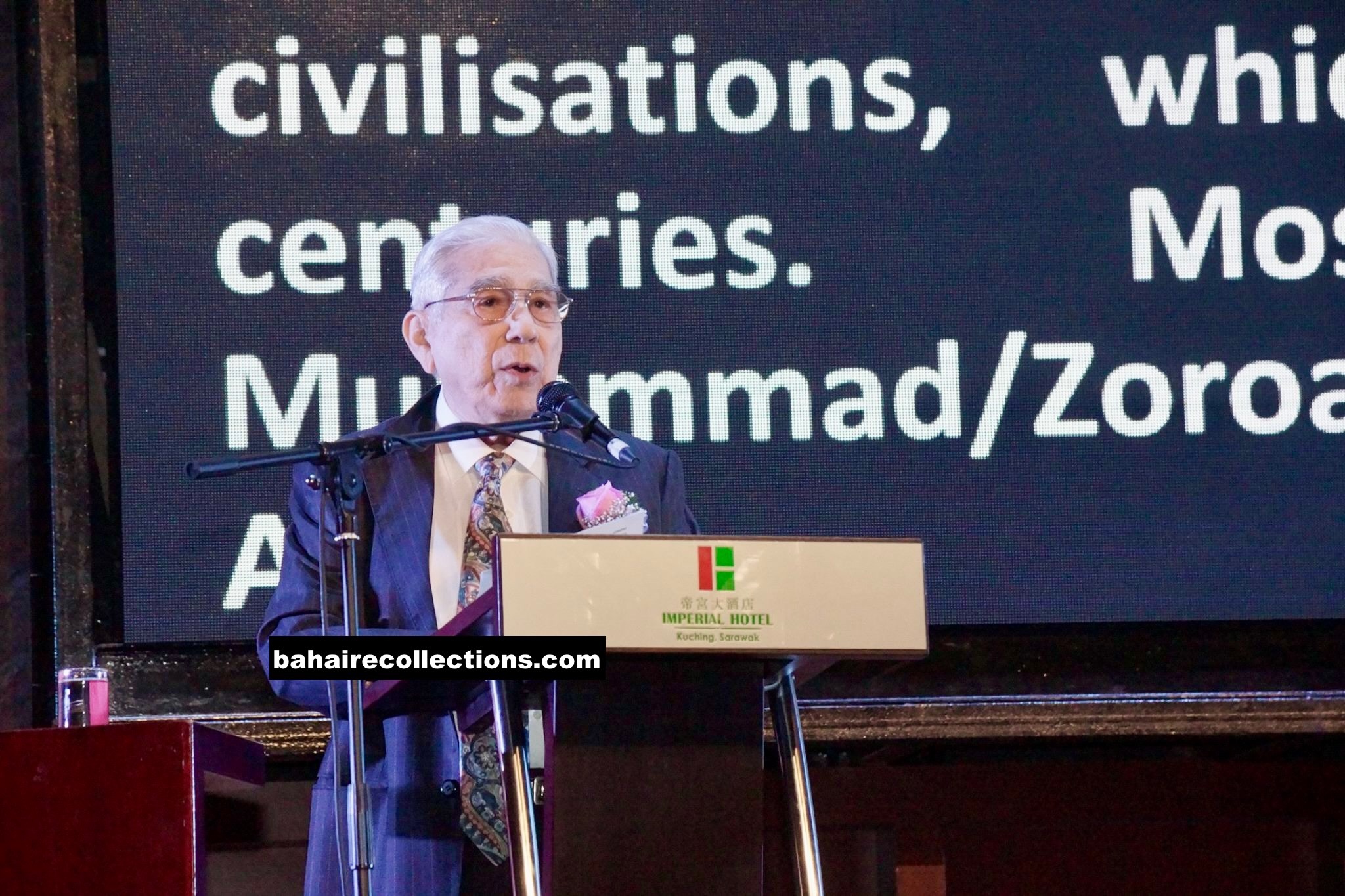 He was an eloquent speaker till his last days on a range of topics. Seen here Dr. John addressing the Malaysian-Buddhist Kalupathi Association Dinner at the Imperial Hotel, Kuching, 2014
He was an eloquent speaker till his last days on a range of topics. Seen here Dr. John addressing the Malaysian-Buddhist Kalupathi Association Dinner at the Imperial Hotel, Kuching, 2014
Sadly, in mid-October 2022 his health deteriorated rapidly over a weekend, and his family members were summoned to be present. Dr. John fell into a coma when at Kuching’s KPJ Hospital with aspiration pneumonia, and the Spiritual Assembly of Sarawak sent out a message asking for prayers. There was a tremendous response from all over the world, from both believers and other well-wishers, assuring prayers and wanting to know his status. Finally, after all his children had arrived, on Saturday 22 October 2022, the precious soul of Dr. John winged its flight to the Unseen Realms, with his sons Kamal and Ian, his daughter-in-law Lorrie, and his granddaughter Lian, with him. Following a highly befitting memorial service held for him on the morning of 25 October at 9 Jalan Rodway, he was taken through the doors of his home for the last time, to be buried at the Bahá’í Cemetery on the Batu Kitang Road just outside of Kuching. Thus ended the exemplary life of a son from an illustrious Bahá’í family. His firmness in the Covenant, his high resolve, strength and vitality of character shall be remembered for generations Perhaps future historians will do justice in recording in greater detail his services for the cause.
A word in conclusion. Accolades after accolades could be placed on the tireless services of this consecrated servant of the Cause. With his passing the Bahá’í world has been deprived of one of its last few living Knights of Bahá’u’lláh. Shoghi Effendi kept a Roll of Honour of all the Knights of Bahá’u’lláh. On 28 May 1992, during the commemoration of the centenary of the ascension of Bahá’u’lláh, the final Roll of Honour was deposited by Rúhíyyih Khánum at the entrance door of the Shrine of Bahá’u’lláh. Dr. John is one of those 254 Knights, who shall forever occupy this unique place and privilege in our history.
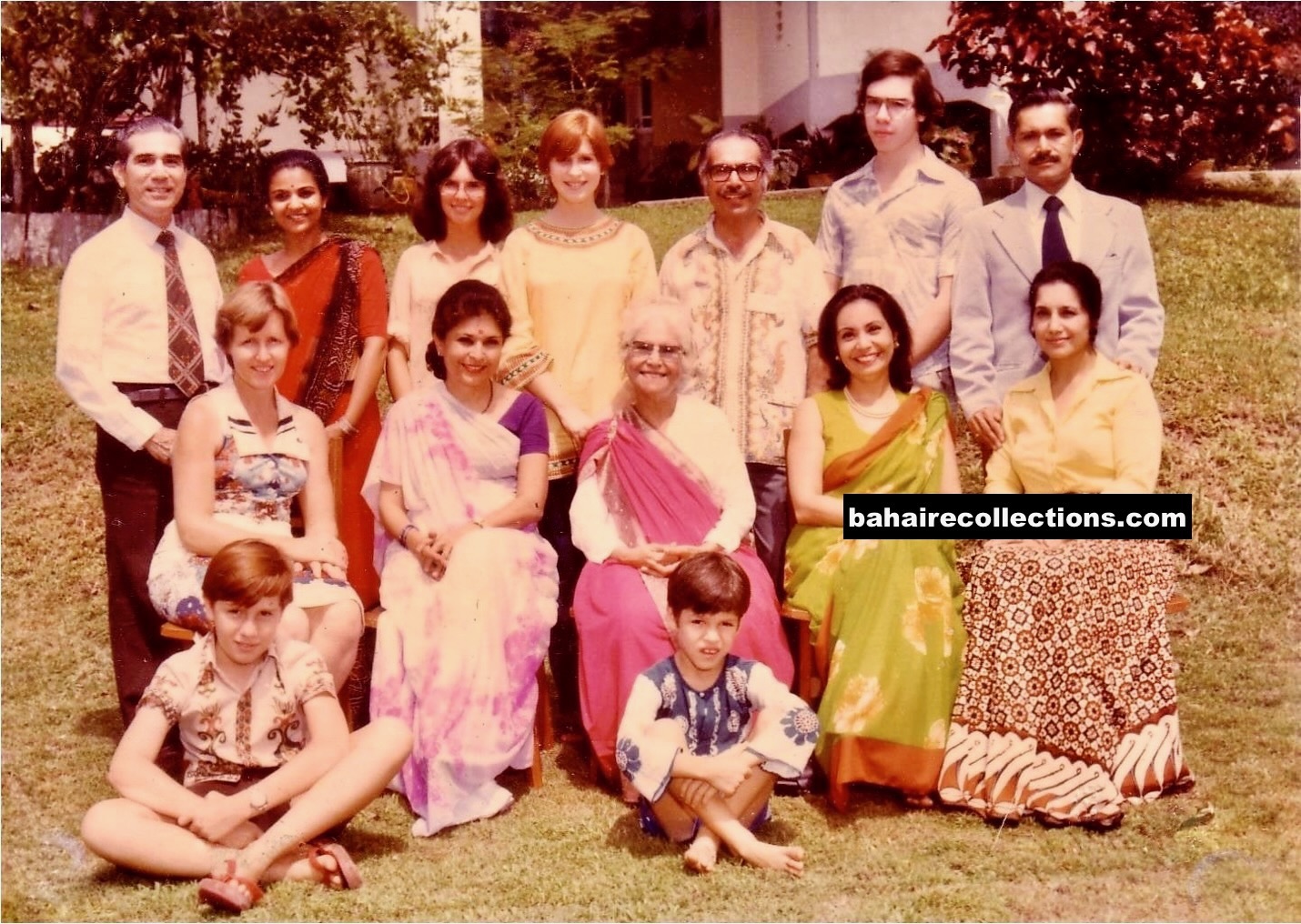 The Fozdar family in Kuching during the South East Asia Regional Bahá’í Conference held in Kuching in 1978. Each member of the Fozdar family shall be remembered for posterity for the indelible services they rendered the Cause
The Fozdar family in Kuching during the South East Asia Regional Bahá’í Conference held in Kuching in 1978. Each member of the Fozdar family shall be remembered for posterity for the indelible services they rendered the Cause
He left a note with his family to place these words on his gravestone when he left the world: “Blessed by his Lord with bounties beyond measure” and the family honored his wishes.
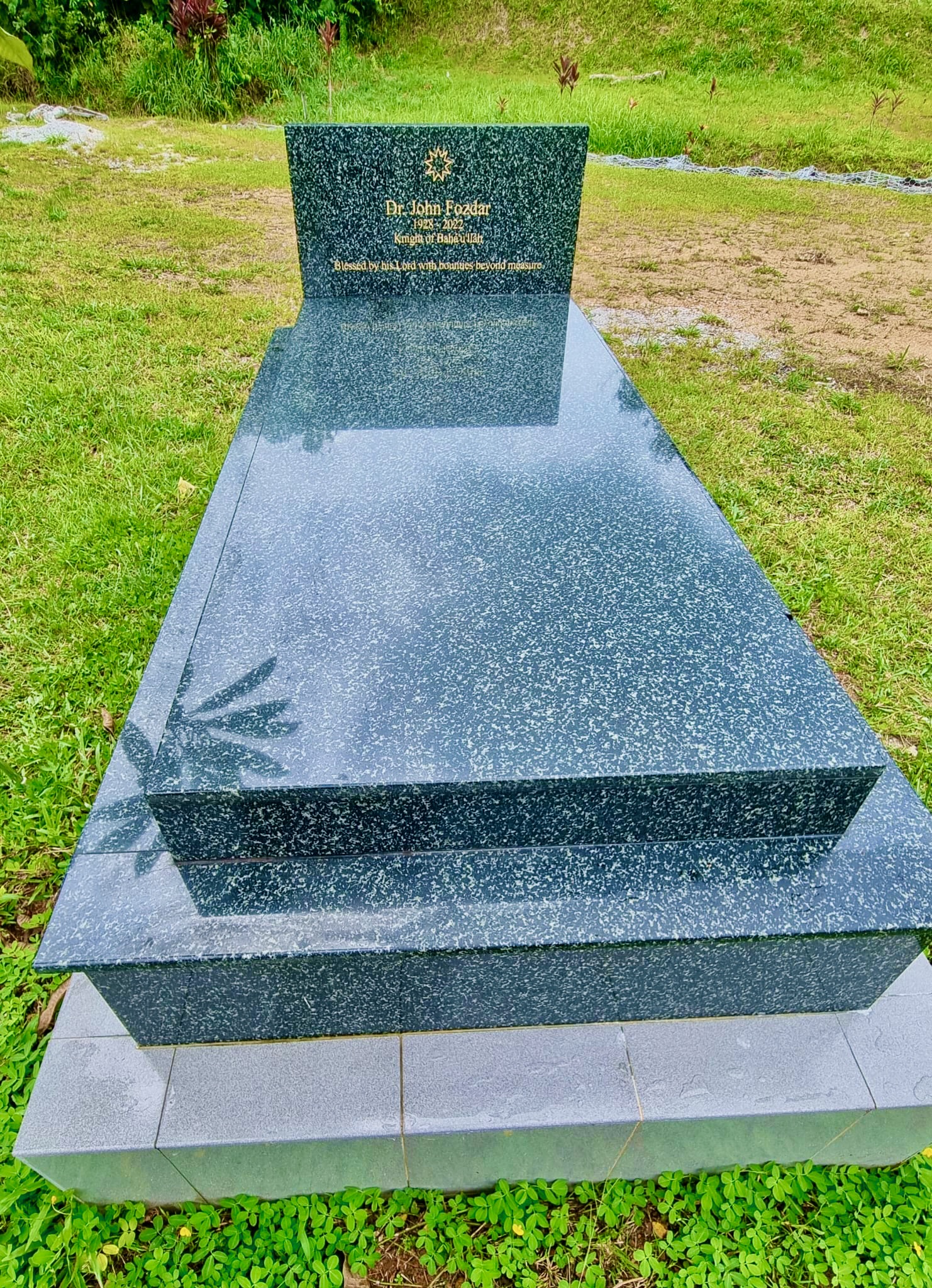
Resting place of Dr. John Fozdar
References:
1. A. Manisegaran, Jewel Among Nations, Splendour Publications, Malaysia, 2003
2. Family of Dr. John Fozdar
A. Manisegaran
26 November 2022
Copyright©bahairecollections.com
You may leave your comments at: info@bahairecollections.com
48 thoughts on “REMEMBERING DR. JOHN FOZDAR”
When I accepted the Faith in 1976 I used to listen to his eloquent talks at the Bahai gatherings. I used to admire the details with which he spoke and more than that the way he would inspire the audience. Then came a time when I had to move to Sabah in East Malaysia. From time to time I visited Kuching and made it a point to pay a courtesy call upon Dr John who was already a Counsellor then, all to get inspired by him.
I wrote to him from Sabah, saying I was interested in moving into Sarawak to serve Bahaullah.
He replied encouraging me to come to Sarawak. So in 1986, I moved into Miri town in Sarawak. From Miri too I paid him visits and I used to admire him as some kind of encyclopaedia of Bahai Faith. He could quote the right verses without refering to books or recall historical events that took place even before I was born. He had so much details which I could not find in the Bahai books.
I learnt punctuality from Dr. John. He was a disciplinarian and yet we became good friends. He was very frank, and that was what I liked in him. He used to give all encouragement to those who arose to serve.
My last meeting with him was on 2 May 2022. Then came the news that he was no more with us. My heart sank! When are we going to have someone of the kind of Dr. John. His whole family is a household name in the service to the Cause. Truly he was a great asset to Bahai community.
As for the story, it is very well written and for the first time I am seeing photos on which my eyes had never fallen before. The write up and the photographs speak volumes. The short video clipping with Dr. John speaking at the funeral of Yankee Leong, brings him back to life. I am unable to believe Dr John is no more with us, given that this story has brought him back to life.
Dorai
Miri
Sarawak
Malaysia
This story on Dr John Fozdar, a pioneer and Knight of Bahaullah was very emotional to read.
As a believer coming from Sarawak, the land where Dr John Fozdar lived and buried his bones, I have every reason to be proud of my association with him for some years. He was a father figure to the community and a father like figure for me as well. Very true that he was a towering figure and a huge tree under whose shade people like me took shelter and refure.
I have travelled with him on many occasion as a translator to translate his talks from English to the native language of Iban. In the course of translating I gained so much on the Faith. On one occasion we came back very late, almost midnight as we departed from Sri Aman heading to Kuching. In those days the road was never that good. I had to keep talking just to make sure he was awake. The journey from Sri Aman to Kuching took more than 3 hours. I have also accompanied him to pay visit to Muslim dignitaries during Ramdan festivals as a Bahai delegation. I also accompanied him to visit the Chief Minister and Governor of Sarawak. He was excellent in cultivating relationship with those in authority. He had the art of opening the doors of those in high office.
I visited his clinic whenever I was not well, and he charged a very minimal fee. And many were given such kindness.
He was a very straight forward person. Once while attending Auxiliary Board members conference in Bangkok in the mid 1980s a group of Theology students came to find out about the Faith. After talking to them for a while, he told them “If you are loyal Christians you should become Bahai.” He was that direct and frank.
With his passing there is a permanent vacuum in Sarawak and the region in which he served. We all knew fully well that he was well connected to several individuals and institutions across the globe since the day he became a believer. Today we really miss him as a doctor and as a learned and well-respected personality.
Bundan Liban,
Sarawak
Malaysia
I knew Dr. John in the 1950s when he would occasionally turn up at our home in Malacca for meetings and giving his many talks to the friends. We were very young then in the Faith so it was always very special to have him educate us in the history and teachings.
Whenever John met his older brother Jimmy (Jamshed) they would invariably engage in a friendly arm wrestling match, they had such fun and for us it was an eye opener, to see two grown men trying to wrestle seriously to see who was the stronger brother!
We were very fortunate in those early days to befriend such great teachers who set themselves such an exemplary life of service.
We are forever grateful to have had those very special moments in time, they will be remembered and treasured.
I also attended in Zoom the memorial meeting organized by the National Spiritual Assembly of Malaysia for Dr. John Fozdar tonight and was touched by the many tributes to his memory.
Leong Ho San
Wollongong
Australia
Mani, you have penned such a moving rendering of the inspiring life and works of Dr. John Fozdar.
We Bahais, especially in Malaysia, have such great reverence and respect for Dr. John Fozdar as one of the towering Bahais, serving the Cause for more than seven decades. He had this unwavering steadfastness, and was always humble and soft spoken, highly spiritual and disciplined.
I have met him at Bahai conferences with his mother Shirin Fozdar. His life and times must be studied by all Bahais to draw great inspiration and spirit, to follow his foot steps which he left in the sands of time.
I have such great reverence, love and respect for a towering luminary and a Knight of Baha’u’llah.
Professor Dr. Ananthan Krishnan
Puchong
Malaysia
A well written story of a servant of Glory, whose family outshone many others of their time with their services to humanity, carried out relentlessly, generation after generation. A rare case of both father and son designated Knights of Bahaullah, and honored for their services.
A lot of details have been added into this story. It while paying tribute to Dr John also makes a beautiful history of the Baha’i Faith in South- East Asia.
The author has been doing his research intensively and I believe has almost covered all salient aspects of the life of Dr. John Fozdar.
Panjawarnam Ganesan
Subang Jaya
Malaysia
Dear Mani
I am sure there are many others would have had closer and intimate relationship and association with Dr. John Fozdar than me. But I have to say from what I had known of him the services of Dr John and his contributions to the advancement of the Cause of Bahaullah , his thoughts for the well being of humanity and his love for his fellowmen would take at least a book. Dr. John not only served but was a good and a kind understanding person from my limited association with him. He considered me his friend for which I am deeply honored.
Will miss forever his depth of knowledge of the Faith, understanding of world affairs, good sense of humour and frankness.
Professor Dr. Jimmy Seow
Perth
West Australia
Mani
Your article on my late brother Dr. John was excellent and detailed and contained some information of which I was not aware.
John was a gifted child and much loved and respected by family and friends. He was everyone’s favourite. He was blessed with a photographic memory read widely, Baha’i books and general knowledge. I would try to emulate him but always failed miserably. I loved him and looked up to him. From a young age it was apparent that he was to be a leader. His views and opinions were highly regarded by his friends. I would often seek his advice when I was a child and until the end of his life. He was an ocean of knowledge both of the Faith and other fields and very popular as a doctor. This is not generally known but in his younger days he was quite a good hockey player.
John was instrumental in getting me into Brunei and that changed the direction of my life. I got a job with the Government because of the friends John had made and the high regard that the officials had for him. He was very generous, and I lived with him in Brunei until he went to UK for further studies. In the few months that he had been in Brunei before I got there he had established a good relationship with the officials and the Faith had become well known among them.
He was an exceptional person and I loved him dearly.
Minoo Fozdar
Australia
Dear Manisegaran,
Thanks for doing a great job in compiling Bahai Recollections.
When I think of this great soul Dr. John Fozdar, I think of a gentle, patient lover of Bahá’u’lláh who was a valiant teacher of the Faith. Except for some NSA meetings before he became a Counselor, I never really had the privilege of knowing him personally. But on those few occasions, I found him to be never aggressive in his influencing skills, speaking in such a way as to make one examine one’s own assertion. He taught me some things which I will always remember.
One occasion there were calls for travel teachers and pioneers among the Malaysian friends. Meeting those goals meant having sufficient funds. Many of the friends were already working and had a family to support. He suggested that Bahai families who were working, could sponsor another family member to fulfill the goals by pooling together the money every month to send to the one who arose or his family.
“Whoso is worthy of so high a calling, let him arise and promote it. Whoso is unable, it is his duty to appoint him who will, in his stead, proclaim this Revelation. . . .”
John was actively involved in giving Bahai radio talks, interfaith activities and creating a reservoir of goodwill for the local Community by making deep friendship with various people in East Malaysia.
Younger friends like us used to enjoy their hospitality especially Grete’s cooking in Kuching when we could meet there. He would share stories about the Faith, quietly deepening us every time. Till today, I would try to emulate this by doing this with our children whenever the family have a meal together.
A month later after his passing on 22 Nov 2022, I dreamt about him. We were in some sort of Bahai gathering. For some reasons, I couldn’t find my sandals and started looking for them. I entered a hall full of people. Dr. Fozdar was sitting in front as if chairing the meeting. He called me to consult about something.
Suddenly as if he had been having a lot of pressures, he started tearing to tell me he was not doing enough for the Faith and wish he could have done more. I hugged him to assure him that he had indeed done a lot to serve the Faith. I too was crying. Woke up.
I think the message he shared with me was that our steadfast love for Bahá’u’lláh must mean that we should do so much more while we are alive on this earth. John as we lovingly called him had indeed done so much in his lifetime, as a pioneer, a father, an NSA member, a Counsellor, a professional doctor.
To borrow a quote from the beloved Guardian:
“Future generations can alone appraise correctly the value of their present services, and the Beloved, whose mandate they are so valiantly obeying, can alone befittingly reward them for the manner in which they are discharging their duties. (Shoghi Effendi, This Decisive Hour, p. 64)”
Yin Hong Shuen
Singapore
Dr. John Fozdar is truly a magnanimous character. His sense of dedication to the Faith is beyond words. At such an early age, he heeded the call for pioneering to Brunei for which he became Knight of Bahaullah. In Brunei and later in Jessleton and Sandakan and Sarawak he had rendered services that shall forever ring his name.
These modern knights, albeit without shining armours, are indeed repeating the history of the Knights of earlier days – to protect their belief and conviction and now with the Holy Words and Writings of the Blessed Beauty.
When we look at living conditions in some of these places, we wonder how these pioneers were able to accomplish such feats fearlessly and courageously. This is the mark of perseverance, steadfastness,diligence and the relentless conviction that each of us may have when we make that decision to go forth where none had gone. To me, such bravery is most commendable and armed with this newest Revelation for humanity we are indeed the chosen ones.
I have met Dr. John a couple of times and his sense of humility and calmness exudes such goodwill which any onlooker would be attracted to.
His stay in Sarawak till his last days is a great feat – the island of Kalimantan / Borneo and the states of Sabah, Sarawak and the Kingdom of Brunei has reaped boundless vibes and energy and spirituality from this unique religion.
His role in Inter Faith processes has helped engender religious harmony in these states which is not easily seen in other places. Such harmony, tolerance and acceptance is critical in establishing a coherent society and community regardless of colour, creed and faiths. His name is a household name in many families.
We will remember Dr John Fozdar for many more generations and it will be in history books of the Baha’i Faith.
Merican
Singapore
Dear Mani,
I read your story on Dr John Fozdar. It is is truly excellent, it’s well researched giving detailed account of the life and services of a giant in the Faith. I had the privilege of meeting him on several occasions, and every time I learned something new. He was knowledgeable in the Faith, and very warm-hearted. I got to know him even better when I was serving under him when he was a Deputy Trustee of Huququllah. He was very well organised, meticulous and through in discharging his duties. There was always something that all could learn from Dr. John.
S. Arulnathan
Kuala Lumpur
Malaysia
It was in mid December 1973 that my friend Ponnusamy brought me to the home of Dr John. Ponnusamy and I were serving in the Armed Forces in Sarawak at that time. As I entered the house I noticed Dr. John having dinner with some youths who were both of Chinese and Iban origin. And that was my first glance at Dr. John, truly a majestic personality.
Dr John had a distinct habit. After dinner he would listen to BBC Radio news. There was no TV at his home at that time. After listening to the BBC news he would talk about certain topic. Then comes the question and answer session, followed by tea and cakes served by aunty Greta. I had never missed his Wednesday fireside cum deepening sessions until I left Kuching in May 1975. Without much effort I got deepened by Dr John. He had such patience to answer some of my silly questions before I accepted the Faith. I accepted the Faith on 23 December 1973.
My foundation in the Faith was laid by Dr John. He had a way to raise one’s curiosity in reading the Holy writings. Once he told me that Bahaullah has written how to change copper to gold and told me to read the Kitab-i-Iqan. I was excited. I took it literally and read that book in full. In the end I found the book containing gems of inestimable value. That was the starting point of my reading habit in the Faith.
It was Dr. John who got the Malaysian Bahai community organised in Russia. As a Counselor for Asia he told the Local Spiritual Assemblies to twin with communities in Russia. The Local Spiritual Assembly of Petaling chose Chita because it was the easiest to pronounce. We sent two youths for a year of service.
I last visited him four years ago when he was 90. Even at that ripe age he always spoke about teaching the Faith.
His passing is a true and irreparable loss.
Karu
Kelantan
Malaysia
Thank you very much Mani for your excellent account of our dear Dr. Fozdar who had nurtured us with his immense knowledge of the Faith. His life-long outstanding services of the Faith to our of the world that spans from Brunei, Malaysia, Singapore and Cambodia has left behind a heritage future Baha’is in this region. Sarawakian Baha’is, particularly Kuching believers, the city where he spent the longest period of his lifetime will fondly remember and cherish him!
Howard Tsai
Taiwan
Thank you so very much dear Manisegaran for sharing the recollection of the life of this most precious soul. It brought back sweet memories of staying at the Fozdar home in Kuching and visiting many localities in Sabah and Sarawak.
Warmest Baha’i love and greetings
Paula Van Den Boogaart
Germany
Thanks Mani for writing about Dr. John Fozdar, whom time shall never forget. I went through the story and found so much information. The story was highly informative and inspiring. Those lovely photos speak more than mere words.
It is not an overstatement to say that the Fozdar family was the foremost in the development of our glorious Faith in Malaysia and the neighbouring countries of Southeast Asia, starting with the arrival of Dr. KM Fozdar and his wife Shirin Fozdar in Singapore in 1950. That was a sweet beginning of a new history for the Faith in Singapore and Malaya and other few South East Asian countries.
Honestly I find it very difficult to describe adequately my inner feelings of Dr. John’s great influence on my own spiritual growth. I gained close association with this remarkable and dynamic person of Dr. John when I and my family moved from Penang to Sabah in 1983. Dr. John was the person I admired most and looked up to most, to say the least. Dr. John was the most loving and understanding person I had known since I had the privilege to associate and served with him. He was very kind in offering guidance and always a strong defender of the weak and feeble ones. I often sensed and observed that Dr. John who had lived a true and sincere Bahai life, with the Faith always in his nostrils and Bahaullah in the center of his very being. He tried his very best to follow the lofty examples of Abdul-Baha in his daily life. Frankly these words of glorifying him, coming from the bottom of my heart may be largely inadequate to portray my true thoughts and feelings of Dr. John.
With his passing the community of the Greatest Name has been robbed of one of the strongest promoter and defender of the Cause in our midst, and the only Knight of Bahaullah nearest to us. I pray that his radiant soul be richly rewarded in the spiritual realms.
Hua Keng Tong
Skudai
Johor
Malaysia
The name Dr. John Fozdar needs no introduction. That magical name is synonymous with the distinctive qualities of love, devotion, faith, sincerity, courage, wisdom, and tireless endeavors in the service and promotion of the Cause.
Dr. John Fozdar with multiple talents, skills, and capacity was, in my humble opinion among the rare gifts of God to mankind, particularly to many people from all walks of life in Southeast Asia. That he was crowned with the title of the Knight of Baha’u’llah is a pride not only to his family members but to his close friends like me and more than that to the history of the Faith.
I need not mention the hundreds of activities that Dr. John Fozdar undertook and accomplished since the story by our historian Manisegaran already speaks well enough, with photographic evidence as well.
I had the bounty of meeting him on numerous occasions. His face always radiated with assertive character and a determined mind, as he focused on completing pressing tasks and urgent projects in some of which I had my own part to play.
My memories of Dr. John are too many to mention. I suffice by mentioning just one instance that explains the kind of person he was. In September 1984 when Amatu’l-Baha Ruhiyyih Khanum came to Korea for 16 days and visited many Baha’i communities in towns, villages, and the surrounding islands as planned by the National Spiritual Assembly, my wife Giti and I traveled with her with great joy and heavenly delight. In the last few days of her staying in Seoul when dinner was given in her honor in a prestigious hotel by a prominent Korean friend from the larger community Dr. John Fozdar, who was a Counsellor then tailored his international travel plan to come to Korea just to see Ruhiyyih Khanum. It coincided with this dinner function as he arrived on the same day and could join the dinner. Ruhiyyih Khanum was very cordial and kind to Dr. John and had him sit next to her. Dr. John mentioned how much he longed to come to see her in Korea and he was not quite sure if he makes it. Ruhiyyih Khanum asked Dr. John if he would say a few words. Dr. John humorously related a story of a local king that was invited to a royal dinner function somewhere in Europe. After the dinner, he was asked to make a speech and he did. The king said “Before coming I knew that I will be asked to give a speech, but I wasn’t sure whether I should give a short speech or a long speech. Therefore, I prepared two speeches, a short one and a long one. But now that have had such a marvelous dinner and respect, I have decided to give both of the speeches. My short speech is “Thankyou” and my long speech is “Thank you very Much”. Having told that story Dr. John said, “Similarly, now that I have had such a wonderful evening and a delicious dinner, I too have to give my speech of “Thank you” and “Thank you very much”. It was a special evening with Amatu’l-Baha Ruhiyyih Khnum in the company of Dr. John. I could see the respect and reverence Dr. John showed towards Amatul Baha who knew each member of the Fozdar family.
His passing has left a vacuum in our midst, a loss never to be filled in the immediate future as it is indeed rare to get this kind of God- intoxicated servant!
May his blessed radiant soul roam in the highest realms.
Kind regards,
Dr. Firaydun Mithaq
Chieng Mai
Thailand
That was a comprehensive write up of a Knight of Bahaullah who has just lfet from our midst. Dr. John shall forever remain part of our history. The history of the Faith in this region, and Asia by extension can never be written without adequate reference to Dr John, and this story is testimonial to this fact.
When I became a Bahai in 1964, I did not know Dr John in person except of the knowledge that he was on the National Spiritual Assembly of Malaysia. Those were the days when we did not have fast form of communication as in these days. We had to depend on newsletters from the national institution chiefly the feast Newsletters and Bahai gatherings to get to know of other believers. So, I got to know Dr John Fozdar as a speaker at Bahai gatherings or at National Conventions. But I was very impressed when I saw him during the Oceanic Conference in Singapore where he delivered a welcome address and traced the development of the Faith in this region without any note in his hands. He was so fluent, clear and concise in his talk. I cannot forget this talk. This is the talk that kept reminding me of how knowledgeable he was. This talks he delivered with such eloquence and inspiration and humility remains in my mind to this day.
G.K. Balan
Kuala Lumpur
Malaysia
As always, priceless stories of inspiration for generations to come. I was deeply moved. Dr John , a consecrated soul indeed!
Asha Sreeni Sisson
USA
Dr. John Fozdar was always an epitome of inspiration and guidance. Observing since 1972, I consider him as a spiritual giant who is unfathomable to my perspective. So my interaction with him was minimum whenever Dr. John came to west Malaysia for any conference or summer/ winter schools.
However when I was in Brunei from 1998 to 2000, I had the privilege in interacting with him. He will come quite often to Brunei as we were forming the Local Spiritual Assembly of Darul Salam once again after a period of lapse.
That is where I got to know him better while travelling with him visiting old Baha’is in Brunei. Again, it was there that I got the glimpses and insights of a Knight of Baha’u’llah Dr.John Fozdar. A rare spiritual giant, Malaysian community will miss forever.
K.Tamil Maran
Seremban
Malaysia
How can we evaluate Dr. Fozdar’s contribution to the Faith, his love that he shared and his extraordinary humanness that touched our hearts? Bahaullah puts emphasis on a person’s ability to love. For me, this is how Dr. Fozdar affected me… one soul sharing love with another.
Looking back on my first meeting with Dr. Fozdar at his clinic in 1971, I remember the two of us sitting down in the patients waiting room facing one another. As I was telling my story about finding the Faith, I felt Dr. Fozdar sensing more about the insecure awkward 24 year old sitting across from him. Because, as I was telling my story, he put both of his hands on mine, a simple touch of compassion that went into my heart and forged an instant trust for the stranger facing me.
You see it was the first time I ever had a father figure in my life, a person who helped me to open up my heart, for the first time, to the teachings, the Bahais and to people around me. Over the next six months Dr. Fozdar gave me the strength to be a better person, the confidence to understand the depth of the Bahai writings and the ability to be love. How can I thank Dr. Fozdar enough for redirecting me on my path that would change my life forever.
Thank you Dr. Fozdar.
Mathews Wagner
Albuquerque
New Mexico
USA
Dear Brother Mani,
Your complete, thorough, and well written account on Dr. John Fozdar truly inspired me.
As a new Baha’i in 1983, two names that were on the lips of the Baha’is at any gathering were Yankee and Mrs. Shirin Fozdar. Some basic information that was given to me was that Yankee Leong was the first believer in Malaya and Mrs. Shirin Fozdar was the one who gave the Faith to Yankee Leong.
Sometime later I came to know about Dr John Fozdar, as the son of Mrs. Shirin Fozdar, and that each member of the Fozdar family played great roles for the Faith in many ways in many parts of the world.
When I was travel-teaching in Brunei recently , I learned that he was designated as Knight for Brunei when he pioneered there in 1954. I also had the chance to meet the late Mr Chin Yun Sang who had served with Dr. John. He shared the dedication and sacrificial efforts of Dr John. There were some uneasiness on the Baha’is due the rumors that the government will ban the Faith. But Dr. John had encouraged, strengthen the spirit of the Baha’is. Mr. Chin Yun Sang was one of the few who remained firm in the Cause in Brunei.
I later met Dr. John when he came for summer schools in Malaysia and also when he visited Malaysia in his capacity as the Deputy Trustee for Huququllah . It was from him that I learned a lot of his elucidation of the subject of Huququllah.
I heard him speak in Ipoh for the 50th anniversary of the Faith in Malaysia, held in 2003. He said that we must see the growth of the Faith as non-linear. The growth will happen unexpectedly, and we will be astonished. How true were his words. In Malaysia we are witnessing this great surge of growth.
During his later years he made a personal visit to the Subang Jaya community for a talk. His talk was at 8.30pm. He came at 8.20pm and there were 5 of us. At 8.30pm sharp, he asked us what time the programme is. One of us told him supposedly 8.30pm but normally the friends will come at 9.pm. He looked at me sternly and asked, “Are you being fair to the 5 friends who came punctually?” We started immediately. And since that day our Local Spiritual Assembly made it a point to start programme punctually.
During this visit he was staying in a friend’s house. In the morning he asked the friend who was his neighbor and this friend answered that the neighbor is one who does not mix with others. Dr John told her that if Baha’is can’t smile and make friends with neighbors how we are going to show to the people of the world our pattern of community life.
So, I had many new things to learn from Dr. John. Dr. John Fozdar is an example for me to emulate.
Thank you
Kavidas Narayanan
Puchong
Selangor
Malaysia
I came to know Dr. John Fozdar, when I was a student of Form 6 at the Dragon School in Kuching in 1975 and 1976. At weekends, I was usually invited by Dr John to visit Baha’i communities in Southern Sarawak and I translated his talks from English to Iban, and so got to move with him closely. In 1989 Dr John was appointed Counsellor and in the next year he appointed me as an Auxiliary Board member and that brought me closer to him, as there were many projects and activities he entrusted me with. Among the Baha’i activities that I was actively involved was the presenting of the Peace Statement to Ministers on the advice and guidance of Dr. John Fozdar. The Baha’is of Kanowit was advised by Dr. John Fozdar to present the Peace Statement to Federal Minister, Minister of Works; Datuk Leo Moggie and State Minister, YB Gramong Juna. Both Ministers were the representatives of Kanowit constituency, at State and Federal level. The appointments to meet the Ministers, were done by Dr. John Fozdar. We were told to meet the Ministers, when they came to their constituency (Kanowit). Despite the tight schedule of the Ministers, the Ministers gave the Baha’i delegation the opportunity to meet them, at different time. Such a courtesy call was made possible because of the prior appointment made by Dr. John Fozdar. Without the prior arrangement and assistance given by Dr. John Fozdar, I am sure we would have been unable to meet the Ministers and present the Peace Statement to them. The courtesy call was even reported in the local newspaper then.
That was one activity that I can never forget. I never knew I would be meeting Ministers. We were just lowly servants of Baha’u’llah and yet able to present the Peace Statement to two Ministers with the assistance of Dr. John Fozdar. I still keep the newspaper cuttings and the photographs taken with the Ministers.
Dr. John was one who gave all the encouragements whenever there was work to be done for the Faith. With his words of encouragement he would easily turn a gnat into an eagle, and that was what became of me whenever he guided me in the Cause. And he believed in excellence in whatever we did for the Faith.
Suai Kirak Clarance
Sarawak
Malaysia
Thank Mani, for the detailed history of Dr. John, a Knight of Baha’u’llah.
From the early times I knew Dr. John as a Baha’i scholar who delivers fluent and illuminating talks at Baha’i gatherings.
I become a little closer to him after I was posted to Sabah state in East Malaysia as a lecturer in a Teacher Training College in late 1990. I had the opportunity to meet him on many occasions while working there. He often visited the Sabah friends as a Counsellor to deliver his talks. Later, I moved back to Johor state in Peninsula Malaysia.
I still remember vividly the few days, when Mr. Dorai and I in spent at his backyard quarters as quests in 2002 to facilitate Ruhi classes at the Kuching Bahai Centre for friends. It was a truly cherished moment to me. Dr John, at times will join us for breakfast before going to his clinic in Kuching town. During my stay, I noticed Dr. John was a very disciplined person though he is always fond of sharing witty jokes with friends. Here, we also record our sincere appreciation to Mrs. Greta Fozdar for her hospitality during our stay there. She is truly a motherly figure!
As I was heavily involved in translating Bahai literature into the Malay language Dr. John often asked about my translation work and showed concerned to produce more literature in that language for the benefit of Malay speaking friends.
I believe Dr John is synonymous with the Borneo islands, in particular Sarawak.
He will be remembered by all as an excellent and as well an eloquent speaker who could deliver talks on any subject of the Faith and also on the history of the Faith. That was his legacy!
Dr. S Nathesan
Muar
Johor
Malaysia
Dear Brother Manisegaran,
Thank you for penning on some great believer who has added luster and fragrance to our Faith not only in Sarawak but in several countries in this region. Allow me to now share my own association with Dr. John Fozdar
The first time I had a personal contact with Dr. John was when he picked up Ganasamurthi Ramasamy of West Malaysia from the Kuching Airport in late 1974. I was a student at the Dragon School and Dr. John happened to visit the school for whatever reason I did not know. I followed him to Kuching and on the way back and he picked up Ganesan and two others at the airport. He, somehow, proudly introduced me to Ganasamurthi as if I was really somebody important in the Bahá’í Faith. I was really shocked and very shy because I knew I did not measure up to that importance, as I was only a few months old in the Faith.
Later on, I happened to bring a few old men who were sick to seek medical treatment. Dr. John gave free consultation and charged them very little. Of course I was there as translator for those patients. And very often he will asked them “Who is the Bahá’í Nabi.”
Like some of the Iban youth, we used to translate for him either during conferences in Kuching or at some other gatherings in some other places. I remember Dr. John very seldom carried note books or papers for his talks. After many months of translating for him, I realized that a lot of his speeches were accompanied by some ethical stories, either from some interesting happening in the Bahá’í Faith or some historical events to support the subject matter of his speech. He had a sharp memory power so much on whatever topic he wanted to share with us, it just flowed spontaneously from his lips. The last time I met him, he shared a story of Muslim fighting Christian and how it came to a standstill because nobody wanted to kill each other. I recollected he had shared that story long time ago. Everything was well stored in his head.
When I was a member of the Bahai Teaching and Administrative Committee, and later elected to the Bahá’í Council for a number of years, his was a member of the Continental Board of Counsellors. Dr. John seemed to give us plenty of guidance in the beginning and later on give us much freedom in our decision-making process. What surprise me most was that Dr. John was always very humble, which is so different from what we experience in the outside world, for a man of this high station in the Faith and in society.
We were both elected to the first National Spiritual Assembly of the Bahá’ís of Sarawak in 1998. Dr. John played a very important role in raising our institutional capacity. I remember he asked me during the 50 Anniversary of the Faith in Sarawak 2003. “Are the locals ready to take over the administration of the Faith in Sarawak?” I think he was very happy to know that the Faith has progressed so far and it was time for the baton to be passed on to the next generation. A year or two later he was no longer elected to the Spiritual Assembly of Sarawak. Nevertheless, he still play a very important role in the local community.
Beside encouraging friends -both young and old -to teach the Faith, Dr. John was very passionate about official recognition of the Faith. He was very persistence about Bahá’í radio devotional programme and ensured that the Holy Day of Naw Ruz is included in the Sarawak Gazette. He paid visits during festivals of various religions. I used to accompany him for a visit to Bishop Aeris Sumping Jingan, Bishop Made Katip, Bishop John Ha, Y.B. Jacob Ridu, Y.B. Patau Rubis, and a few other Very important persons and also a visit to Chief of Police for Sarawak, who is at the time of writing the present Malaysian Police Chief Datuk Sri Acryl Sani Abdullah Sani
The last two visits I made to Dr. John was probably the most memorable experience and historical too. After sharing some information about some early Bahá’ís and also getting to know what he thinks of the Bahá’í school teachers, he accompanied me out until almost to the outer gate of his residence. I was really taken aback by such love that he showed me, and that made me decide to make another visit and record what he has to say. So, I made another visit. This time I made sure I do the recording of his story about the early believers in Brunei. He was still very concerned about those early believers and those who played a very significant role in spreading the Faith in Sarawak. I am sure he has all the names of these believers in his personal archive. I assured him that I will look into the biography of some of these early Iban teachers and find out where their graves are. He was also very persistent about what roles and opportunities that Baha’i school teachers have in sharing the Bahá’í teachings with teachers and students. I also assured him that I will share his ideas with some of the school teachers whenever I happen to meet them. The first opportunity would be to share the ideas with a representative from the Bahai International Development Office who is going to meet the Bahai school teachers this weekend in Kuching.
Now that such a majestic figure is no more with us, I am wondering how we are going to perform these manifold duties without Dr. John around. But he has certainly left sufficient guidance and examples for the next in line to take over the baton.
On a personal note, I am sure he is very happy in the Abha Kingdom albeit the many works he still need to do – as promised by Bahá’u’lláh “service in both worlds” and I am sure he is also guiding and protecting us from above.
Tipik Ladi
Kuching
Sarawak
Malaysia
Drops of tears roll down my checks and my heart bleeds with sadness as I pen these few lines to express my true feelings on the loss of my great and close friend, and a Knight of Baha’u’llah, the late Dr. John Fozdar.
He was a great loss to the Baha’i communities of West Malaysia, Sarawak, Sabah and Brunei as well, where he has left marks that can never be erased over time. Sarawak was so blessed to have in person Dr. John as Baha’u’llah’s torch-bearer who was a spiritual guardian to the people of the Borneo Island, especially the natives.
I was nurtured in the Faith by Dr. John. I recall with great pride of my association with this dynamic figure. The first time I met Dr. John was sometime in April 1970 during the grand opening of Sungai Turong Baha’i Centre, Samarahan in Serian District. I was his translator for his talk. I declared as a Baha’i sometime in July 1970, and after attending the Singapore Baha’i Oceanic Conference, I served a year as travel a teacher.
Sometime in year 1972 l served as a member of Sarawak Baha’i Teaching And Administrative Committee and Dr. John served as a Chairman. I had served long years in various Baha’i Institutions together with Dr. John including as a member of Local Spiritual Assembly of Kuching, National Spiritual Assembly of Eastern Malaysia and Brunei, the National Spiritual Assembly of Malaysia and the First Sarawak Baha’i Council. It was Dr. John who assigned me to produce Baha’i Devotional programmes broadcast by Iban Service, RTM Kuching. So it is indeed very difficult to erase the memory of Dr. John from my soul.
Dr. John had deep knowledge of the Bahai Faith as well as verses of the Bible and Quran. He could speak on any topic without prior notice.
The one areas where Dr. John left his indelible mark was in building excellent relationship with the Brunei Royal Family and some high profile Sarawak politicians including the Sarawak first Chief Minister, the late Tan Sri Datuk Stephen Kalong Ningkan, the former Federal Minister for Sarawak Affairs the late Tun Temenggong Jugah anak Barieng, and the Sarawak State Ministers such as the Deputy Chief Minister Tan Sri Datuk Stephen Yong Kueh Tze, the late Tan Datuk Sri Sim Kim Hong, the late Tan Sri Wong Soon Kai, the fomer Sarawak Chief Minister late Datuk Patinggi Adenan Haji Satem, Tan Sri Datuk Leonard Linggi anak Tun Temenggong Jugah. He also had close contact with some top Sarawak officials including the former State Secretary the late Tan Sri Gerunsin Lembat who gave approval for Baha’i Holy Days to be included in Sarawak Gazette.
Dr. John had close contact also with other public figures including the Manager of Sarawak Transport Company the late Mr. Chan Siaw Hee who gave permission for the Bahai quotations to be displayed on buses which run on the Kuching-Serian route.
Dr. John also had close and very cordial relationships with many high-ranking religious leaders. The plot of land at the Baha’i Rose Garden at Jalan Batu Kitang, Kuching was a gift from the Roman Catholic Mission of Kuching and that was the fruit of his close relationship with the Roman Catholic mission of Kuching.
Dr. John through the kindness and approval from the Director of Radio Sarawak the late Haji Salleh Askar got the Bahais to have the Baha’i Devotional programmes broadcast in English, Chinese and Iban languages.
Dr. John was a well-known and profound physician in Kuching, and the Baha’is and the poor people coming to his clinic for medical treatment were charged very nominal fee.
Sarawak is so blessed to have a faithful servant of Baha’u’llah in the person of the Knight of Baha’u’llah. He comes from an illustrious Bahai family where each member registered their marks in the history of the Faith. Dr. John’s father Dr. K.M Fozdar was a knight of Bahaullah for opening the Andaman Islands under the Ten- Year Crusade. His mother Mrs. Shirin Fozdar had sat on the lap of Abdul-Baha as a child.
Personally, l found Dr. John a caring and loving friend who was always frank and straight forward and could be stern as well- all for good reasons.
Sometime in August this year he called me to come over to his house, where he shared with me his proposal on how to approach others to share the teachings Baha’u’llah. He also made another proposal for the Baha’is to put up a tombstone on the grave of an active Baha’i teacher the late beloved Mr. Sapong anak Andar of Kampong Semukoi, Serian. We are currently carrying out his last wishes. When he spoke to me I did not realise that would be our last meeting. But I could sense the urgency with which he spoke. What he has achieved as in individual in Sarawak shall forever be used as a benchmark for generations yet to be born to emulate!
Ragai Lang
Kuching
Sarawak
Dear Mani,
Thank you very much for the precious historical story of dear Dr. John Fozdar. He was truly a great example, a fatherly figure and mentor to so many of us.
I will try to recall and write my connection with this great soul – Dr. John Fozdar.
In 1973 I was studying veterinary science in India and a Malaysian Baha’i told me about the Faith and I accepted the Faith in 1974 in Bombay. That friend mentioned about the Fozdars in Sarawak and Yan Kee Leong being the first Baha’i of Malaya. He later took me to the Baha’i Centre in Bombay and soon I started attending deepening classes conducted by Mrs. Zena Sorabjee. At that time I did not know that she was the sister of Dr. John Fozdar. I had also met Mrs. Shirin Fozdar but did not recall at that time that she was the mother of Dr. John Fozdar.
I came back to Malaysia in 1975. It was in 1978 that I met Dr. John Fozdar in Sabah and was enchanted by his gracious manner and eloquent talks. Later as a Baha’i Counsellor, he, along with his Auxiliary Board members in Sabah had a great impact on me and of course other friends too. In one of the conferences in Sabah we were so ‘moved’ by his talk and he jokingly said maybe some of us would think of him as some kind of God.
In 1982 he sent me and my wife a lovely letter on the occasion of our wedding with a separate letter for the National Spiritual Assembly of Japan.Till today, I treasure these letters. We always enjoyed meeting and listening to Dr. John and his dear wife Aunty Grete Fozdar.
1992 being the Holy Year we left Sabah and settled in Japan. With the start of the computer age I used to enjoy Dr. John’s postings on Facebook. At times we communicated using messenger and occasionally talked too. He was always keen on knowing if I was teaching the Faith instead of just doing Ruhi courses. He was happy when I replied that we are trying our best in teaching activities. My last message to him was on 12 th October when he was not too well, and his reply was, “Dear Jana. Grete and I are both well. At present, my daughter Shirin and family are visiting us in Kuching. On Saturday, Kamal will join us. I remind them of Baha’u’llah’s command ‘If you have to choose your father or God, choose to serve your father.’ They are doing just that. Love to you and wife and son. John.”
When he was moved out of the ICU ward I thought he was getting better. We were both shocked to know that he left all of us suddenly for the Abha Kingdom. I know he is always helping us from the unseen Kingdom of God.
As I write this comment, I reflect on these words by the Blessed Beauty:
O SON OF JUSTICE! Whither can a lover go but to the land of his beloved? and what seeker findeth rest away from his heart’s desire? To the true lover reunion is life, and separation is death. His breast is void of patience and his heart hath no peace. A myriad lives he would forsake to hasten to the abode of his beloved.
-Bahá’u’lláh
Dr. Janardhanan
Japan
I first met Dr. John in 1959, when I was investigating the Faith. My elder brother Bhaskaran had become a Bahai in October 1959 and I had just returned from the UK in December after completing my teacher training. Upon arrival Bhaskaran mentioned to me the Bahai Faith and took me to the house of Leong Tat Chee where I got to know the Faith in greater details. It was in that same week that a Bahai meeting was held at a hotel in Kelebang Kechil area in Malacca town and I was taken there. Dr. John who had completed his further studies in medicine in the UK was back in Singapore and dropped in that meeting. That was the first time I met Dr. John. He not only spoke eloquently, but had a great intellectual understanding of the Faith which attracted me. That his talk was intellectual was the same feeling all the participants felt.
In 1965 and 1965 I was serving in the National Spiritual Assembly of Malaysia and he was also on the same institution. But I left for pioneering in May 1967. Yet my association with Dr. John can never be erased from my memory. He was forceful in carrying out his services for the Faith and he did achieve a great deal for our Cause. We need more of such workers for the Cause. Truly a great loss to the Bahai community.
Dr. S. Vasudevan
Pune
India
Mani
Thanks for a great account of Dr. John Fozdar in which you had written in detail the life activities of this very much revered personage who will be remembered through the ages and cycles.
I do not wish to repeat what you had written but will humbly add the following personal experiences in connection with him. Dr. John Fozdar was a panel doctor for staff of Bank Negara (Central Bank) of Malaysia. I know for sure he would without fail ask every time a staff member who sees him if he or she knew me, followed by mentioning that I am a Baha’i. That was the extent of his teaching activities, teaching at every and any opportunity he gets. Every time I visited an East Malaysian town, like Sandakan, Kota Kinabalu and Sibu he would track me and inform the communities there. I am not sure whether I had done justice for the efforts he had taken. Besides above my relationship with him was as fellow colleague of the National Spiritual Assembly of Malaysia and subsequently as Counsellor for the region. He was anxious to provide input on the discussions with the Assembly and he had always stated that if we had already made our decision, do not call him. He didn’t want to be just a listener. He wanted to be an active participant in the thought and decision process. Once he told me that as the Treasurer of the National Spiritual Assembly my role was not an Accountant of the Assembly and suggested for me to go out and inspire and motivate the community to contribute. Well, I think I tried but he now knows whether I did.
Lum Weng Chew
Totonto
Canada
Remembering Dr. John Fozdar..
My recollections of Dr. John Fozdar and his loving family goes back to January 1963. They generously hosted me for three weeks before I moved to my pioneering post in Laos.
The Fozdar brothers, Jamshed, John and Minoo, and their families, were instrumental in sustaining several pioneers at their posts before and throughout the Ten-Year Plan of 1953-1963 in Southeast Asia, which included me as well. This multi-layered sustenance enabled the international pioneers to acclimate in the new environment, learn of the native cultures and languages, and secure jobs in order to efficiently serve the Faith in various regions. Through encouraging letters to the pioneers, by recommendations and letters of introductions to their contacts to accommodate the pioneer, and through financial assistance—whether personally or through the elected institutions of the Faith—they made sure that these dedicated individuals, who had forsaken their homes for the sake of assisting the Faith of Bahá’u’lláh in pioneering posts, get established securely and engage in the tasks before them.
Dr. Fozdar and his gracious wife, Grete, were accommodating me for three weeks in January 1963 before they facilitated my transfer to Laos where I was to join my friend, Firaydun Mithaq and other pioneers in Vientiane. Since I had left Iran on 5 December 1962, I was trying to secure permanent residence for Malaysia. But the efforts did not bring the desired results. After three months of staying with Minoo and Marjorie Fozdar in Brunei, and visiting the Ibans in their places of residence, it was sure that I could not obtain residency in Sarawak and Brunei. Going to Sandakan, the Capital of North Borneo was my last effort and Dr. Fozdar and Grete helped me to get over the disappointment and help me weigh my options to continue serving in Southeast Asia. Laos seemed to be the favorable country where obtaining residency visa was available, so were jobs and employments.
During the three weeks in Sandakan, I also met Mr. Harlan Lang, the American pioneer who had just arrived there. The Fozdar hospitality and their demeanor helped the people around them to aspire for the best that they could do for the promotion of the Faith of God. As young pioneers, we learned about how to live a balanced life as a means of prolonging our services to the communities we lived in. Dr. Fozdar’s way of life inspired us to reach a level of devotion worthy of the Cause of God.
In mid-1960 Dr. Fozdar had made a trip to Tehran, Iran. During his stay there my parents visited him and personally thanked him and the Fozdar family for assisting the young pioneers in their service to the Cause of God. I for my part feel lucky that my life of service in Southeast Asia was supported by the members of Fozdar family, first Shirin khanum, and by Jamshed and his family, then by Minoo and John and their families. I and my family always pray for all the Fozdars to the threshold of Abhá.
Bijan Bayzaee
Chicago
USA
Dear Manisegaran,
Wonderful memories of Dr. John Fozdar!
I did not have the opportunity to move closely with Dr. John, but have seen him from distance and always enjoyed listening to his talks. He always spoke with a radiant smile on his face and he had his facts at his fingertips. I had never seen him using any notes. After the talks are over he would go around shaking hands with the friends and converse with them. Even while conversing he was smiling.
That is the extent to which I had known Dr. John, but reading this story I can see the amount of sacrifice he had done, the responsibilities he had shouldered and the great amount of services he had carried out for the Faith we all love so much.
I pray for his pure soul to progress in all the worlds of God under the sheltering wings of Bahaullah
Vellaiyan
Seminyih
Selangor
Malaysia
I am providing the essence of what I spoke at the Memorial Service held in honor of Dr. John Fozdar, organized by the Spiritual Assembly of the Bahais of Malaysia on 27 November 2020.
We all have known Dr. Fozdar as a Knight of Baha’u’llah, member of the National Spiritual Assembly of Malaysia for many years, and Continental Counsellor for Asia, just to name a few. Here I wish to confined to my personal impressions and memories of Dr. Fozdar. I must make it clear that I am not a friend of his – not like I can call him up and tell him to buy me lunch or something like that! So, these are my personal memories and impressions.
After my retirement, I made a special visit to Kuching to see him – sort of paying my respects and to consult him on what I should and could do for the Faith. He was one of those who I have always respected and looked up to. He had always guided me, encouraged me, pushed me in which helped me grow a little every time!
HOSPITALITY:
As was his usual habit and hospitality, he insisted we stay in one of the rooms in his house. I am sure many of us from West Malaysia have experienced this hospitality where he will not allow any visitor to stay in a hotel. I have had meals in his house, was his guest at his club etc. This time he even took the trouble to show us around Kuching and the new renovated places as it has been a few years since I visited Kuching.
CLASS:
When one meets Dr. Fozdar one is immediately attracted by his classiness – there is a certain classiness, dignity in his bearing, his manner of speaking that one admires and very few of us can attain. It is not because he was serious but because he was quite a humorous man. Even when cracking saucy jokes, it was filled with a classiness that the jokes can be told in mixed company of any level. It could be at lunch with senior government servants, politicians (of whom he knew many), at some social gathering such as a Red Crescent gathering.
HUMOUR:
He had a store of jokes for many occasions and told it at the most appropriate times. It was always funny. I asked him once where he got all these jokes – his reply –Readers Digest! It can range from religion, politics, geo politics to marital affairs.
VAST KNOWLEDGE:
He has such a wide knowledge that it is easy for him to link it to a joke, an anecdote and history. His grasp of religion especially Christian subjects was awe -inspiring and so it is too with other religions. He can explain the history of the various clashes between the different families in the early days of Islam and the consequences etc. Quite amazing. His knowledge and vast experience is very impressive and in almost every conversation I have had with him, l have always come away with some new knowledge or a better understanding on the subject we were talking about. It is so wide ranging that it would be impossible to categorize as it can range from politics in the election of the Catholic Pope to what happened during Catherine the Great’s reign in Russia.
PHOTOGRAPHIC MEMORY:
I suspect he has a photographic memory as he can recall many things he has read with absolute clarity. For instance, “Oh I see you are reading this book. It is rather interesting book with many valid points but there is one point I didn’t agree with. You have not come to it yet? Well, it’s between pages 152-153 in Chapter 12 (I am only guessing this as I’ve have forgotten what the point was or even what was the book, let alone the page or chapter!!!). I read this 14 years ago”. Amazing. After that I was really careful with what I say when talking to him. I have always kept my reports or replies short and without embellishments.
VAST EXPERIENCE:
His vast experience and knowledge made it through in all our conversations and have always made me learn something new or improved my understanding of the point. It is not that he made it a point to teach you, it is just you learn from his experience and his knowledge when he relates a story or made a point. Sometimes you get a shock from what he tells you. For instance, once he nearly gave me a heart attack when he said something. I got a call one night from Dr. Fozdar and he wanted me to go to Taiwan as the ITC was very excited over the teaching success there and wanted the Counsellors to find out exactly what is happening there. If it was really that successful they might want to use this as a template for other places, and is it sustainable? He told me none of the Counsellors can go immediately and wanted to deputize someone from the ITC to do this. At the end of the conversation, he said “and don’t worry as you are going with the full blessing of the ITC. The conversation went as follows:
Me: What do you mean Dr?
He: We asked the ITC since we can’t go immediately, can we deputize a member of the International Chinese Teaching Committee to go do this verification?. The ITC came back and asked us “WHO”? And we told them first choice James Liew and if he is not available, then 2nd choice was Mr xxxx . They came back “APPROVED”.
Me: Whoa! Doctor, you are telling me that the ITC knows us individually. They know me?
He: Of course, they do. They know your strengths and weakness otherwise they won’t ask who.
This was frightening information to digest for me. Here I am with all my indiscipline, indiscretions, my skeletons, and little things that I thought was well hidden away. AND now I find they know? So, if any of you think you can misbehave and get away with it, please think again.
LEGACY:
We are here today because of the contributions, the sacrifices, the services of Dr Fozdar and his contemporaries of that generation. Lest we forget we build on what was achieved at every stage of our growth which demanded a different service and a different vision. My wish is that the National Spiritual Assembly encourage Local Spiritual Assemblies or Clusters to hold befitting memorials for Dr. John Fozdar.
James Liew
Kuala Lumpur
Malaysia
Thank you very much Mr Mani for a very well written and inspiring account on Dr. John Fozdar, the Knight of Baha’u’llah.
In the early 80s, I used to attend firesides every Wednesday together with other youths at his house. He was such an eloquent speaker and can talk on many Baha’i subjects to inspire us during the fireside.
When he was a Counsellor, I was an Auxiliary Board member from 1986 to 1991 and had regular contact with him through regular correspondence. He provided abundant deepening materials and wrote personal letters to inspire the community. I remember at one time, when I submitted my monthly report about activities in the Northern Region of Sarawak, one of his suggestion was, “Can you buy a new ribbon for your type writer?” He was very frank and all was for the good of the Cause.
Besides working under his spiritual care and guidance as Board member, Dr. John also entrusted me to hold a receipt book for the Huqu’qu’llah contributions and I learnt a lot while serving as a Huqu’qu’llah representative. He provided learning materials on the subject of Huqu’qu’llah.
It was also a privilege for me to serve together with him in the Spiritual Assembly of the Baha’is of Sarawak and also accompanying him to pay visits to some state dignitaries and ministers to proclaim the teachings of Baha’u’llah.
On many occasions during his visit to the long houses or local conferences, I had the opportunity to be his translator from English to Iban language.
He was also my family doctor providing excellent medical care and advice.
His service to the Faith in Sarawak was so great and will be forever remembered by generations to come.
Dajai Mancha
Kuching
Sarawak
Dear Mani
After reading your story on Dr. John, it took some time for me to write my comments about him. It was so emotional for me when he is gone forever. He was more than a father to me for the last 15 years. He looked after my health; he guided me in everything I did for the Faith. Until today I am still paying the bill for his mobile phone.
I have worked with his son Kamal since 2004. At that time Dr. John was still working as a doctor and our office was on the first and second floors above his clinic. He would come up if there were less patients and we talked, joked and of course our talk was more on the Bahai teachings. A few years after that he retired. So, he had full time doing Bahai work. People cannot imagine how he served the Faith. After retirement he did all the Bahai paper works at home and at Kamal’s office.
I have known him since I was born. But it was only in the last 15 years that I got to know him exactly who he was as a Bahai worker for the Cause. He was a very humble person, loving, very assertive and yet very cheerful, very much caring for others, very respectful and of course very intelligent. He gave guidance to all of us in Sarawak until his last breath. Not only to Bahais but to everyone he came across. Everywhere he went, he will mention the word Bahai.
Sometimes, he was doing locum at his previous clinic and most of the patients came just to just say hi to him instead of getting treatment. That was how close he was with his patients. Even with his previous clinic staff, he made sure he got together with them once in a while.
He was the President of Malaysian Interfaith Network. He made sure to wish followers of all the other religions on their religious festivals. He made sure I sent the letter by hand to all the churches, Islamic Centre, Buddhist, Sikh, Hindu & Soka Gakkai association. He made sure to get recording of speeches at every function when Bahai is were invited and the word Bahai is mentioned. He made sure to get 3 copies of the newspaper if the word Baha’i is mentioned in the paper for archives and historical preservation. He made sure to come to all the meetings or occasions if he was invited even though he was not in the good health. I will drive and accompany him or sometimes we go by grab since he needs someone to support while walking on the stairs with help of walking stick.
He was very humble and refused to get any award from the government of Sarawak. He said, the award in this world is nothing compared to the next world. He never burdened people around him, even his own children. The last word he was saying on his death bed in the hospital was “ I am okay, just say prayers”. And then he was no more.
What he kept reminding me was, “Teach the Faith. If you do not, you have to answer Baha’u’llah in the next world. As a Bahai, if you want to do something, always do the best.” He set a good example of how all of us should be as Bahais working for the Cause.
His passing was not only a great loss to the Bahai community, and the whole Sarawak, but to me personally as I have lost a true father.
Winnie Lambong
Kuching
Sarawak
Malaysia
Dear Manisegaran,
Thanks so much for sending this story to me. Interestingly, this was forwarded to me by a Bahai in the Marshall Islands. It’s a very complete record of Dr. John’s Baha’I life. I learned details that I never knew before.
My first time meeting John was in Sandakan in January of 1964 when I arrived from the U.S. wearing a nice wool suit. People wore suits in those days when they travelled, but wool was not good for the Malaysian climate.
One thing I’ll always remember about John is his sense of humor. I stayed with John and Grete for about a week, then flew to Brunei for a few days to be with his brother Minoo and wife Marjorie before flying to Kuching where I used the leads they gave me for applying for a teaching job in Kuching. I stayed at the Bahai Centre, a building which John had bought in preparation for his own move to Kuching in October of the same year. There was another Bahai, Ong Chun Fong, already staying at the Centre. I had been a Bahai for just 3 years at this point, so John was a wealth of knowledge and experience for me. Another really positive quality of John was his ability to teach the Faith through story telling. John was the MC at our wedding in 1965. His 7 year old daughter Shirin was our flower girl. John was always a joy to visit with.
With warmest Bahai greetings,
Harlan Lang
USA
I had known Dr. John from the time he came into the first National Spiritual Assembly of Malaysia in 1964. Since then I had listened to his talks at various Bahai gatherings, and all his talks were very informative and inspiring. Such are the elders under whose guidance many of us grew in the Faith and I am happy his life history is well recorded.
The Faith in Sarawak very much revolved around him. He was the first to have created many firsts for the Faith in Sarawak. His friendly contacts with those in authority and his cordial relationship with those belonging to other religions is something legendary.
The history of the Faith in Sarawak, Brunei, Sabah and West Malaysia cannot be written without adequate mention and reference to this Knight of Bahaullah. With his passing there is a bog vacuum that would not be easily filled.
N. Nagendran
Kuala Lumpur
Malaysia
I read the story of Dr. John and was moved to tears. When I was living in the seventh mile in Kuching in the early 1970s I was deepened in the Faith by Dr John. Although I had accepted the Faith earlier in 1967 through my elder brother Vasudevan, it was my stay in Kuching that actually made me a Bahai through the deepening that Dr. John gave. He drilled into my soul the concept of the Covenant and the obligations of a Bahai. Equally important was the role that his wife Grete played in the spiritual education of my children. She used to fetch my children from my home and take them to the Bahai children classes. Dr. John and Grete used to emphasis on bringing up the children in the Bahai way.
Dr. John was a very soft hearted person. I was at the Feast in 1976 when Dr. John spoke of the passing of Captain Choo Yeok Boon. As Dr. John recollected about Choo Yeok Boon, he broke down and all of us cried with him.
Dr. John has luck with his hands as a doctor, as the Indians used to say. My son Murali had tonsilitis and no treatment could cure him. I made several visits to several doctors, but all in vain. With just one visit to Dr. John, my son was miraculously cured, which I shall never forget. Dr. John shall live in my memory forever.
Sukumaran Sankaran Nair
Taiping
Malaysia
Dr. John Fozdar as Deputy Trustee of Huququllah was to play a significant role in the education of the friends in the region with the formation of the Board of Trustees for South-East Asia, comprising appointed Deputy Trustees from member countries, together with their representatives.
With the publication of the Kitáb-i-Aqdas in English in 1992 the law of the Huqúqu’lláh became universally applicable.
“It seems fitting, then, that the sacred law which enables each one to express his or her personal sense of devotion to God in a profoundly private act of conscience that promotes the common good, which directly connects the individual believer with the Central Institution of the Faith, and which, above all, ensures to the obedient and the sincere the ineffable grace and abundant blessings of Providence, should, at this favourable juncture, be embraced by all who profess their belief in the Supreme Manifestation of God. With humility before our sovereign Lord, we now announce that as of Riḍván 1992, the beginning of the Holy Year, the Law of Ḥuqúqu’lláh, the Right of God, will become universally applicable. All are lovingly called to observe it.” -Ridvan Message 1991 – To the Baha’is of the World.
Under Dr. John’s guidance the annual Board of Trustees meetings were to be rotated and held in different South-East countries. The event will coincide with a regional Huququ’llah meeting and Conference in the country itself. This has become the norm and thus served the dual function of education of the Baha’is on the institution of Huququ’llah and taking stock of the situation in the respective countries. Follow-up with lines of action for further understanding and loving compliance to the sacred law.
This is one of the great legacies of Dr. John Fozdar, which has remained unobtrusive.
Wong Meng Fook
Singapore
Dear Mani ,
The accomplished mission and works of Dr. Fozdar are truly historic – as such a distinguished Bahá’í he is surely be an example to others.
I knew Dr. Fozdar and Grete when I was just a newly declared Bahai in 1970 – attending meetings between the rented Tabuan Road Bahai Centre and Dr. Fozdar’s residence at 9, Rodway Road Kuching. But it was here during the many weekly Wednesday evening firesides that I was truly motivated by the talks by Dr. Fozdar. These difficult and challenging days, fireside after fireside – without fail – which must have been strenuous for both Dr. Fozdar and Grete attending to those in these gatherings.
It must have being very strenuous for Dr. Fozdar to devotedly take efforts for the spread and consolidation of our beloved Faith.
I had attended countless talks of Dr. Fozdar and have learned much during his vast teaching efforts.
I am certain that his many services to the Faith have won for him accolades and of his services future generations will gratefully and joyfully remember and emulate.
To me, Dr. Fozdar was my motivator, a teacher and a loving father.
I wish to reaffirm my deep sense of sympathy on this sad loss to Grete and her children .
Lim Pun Huat & Christine
Sri Aman
Sarawak
Malaysia
Mani
Your well-written account of Dr. John, his dedicated and outstanding services and sacrifices for our beloved Faith is excellent. I do not think anyone else can do a better job than you. Honestly I have nothing to add that can do justice to what you have so laboriously researched and so beautifully presented with photographic illustrations.
My personal interactions with Dr John started in the early years of my youth and of course, much into my adult Baha’i life. But from the first moment we met, I was struck by his towering demeanor, the profound depth of his knowledge, the eloquence of his presentation, the clarity of his arguments and the force of his advice with regard to serving the Faith. Indeed he was, to many of us and to those who met him, the inspirer, the empowerer, the mentor, the advisor, the pusher, and the model teacher. These are appellations that truly befit and thoroughly reflect his deserving eternal title as a Knight of Baha’u’llah! There is something majestic-like about him. It can be said that as a growing youth, I literally sat at his feet to learn! My last meeting with him was just about 6 months ago before his passing and what a powerful reunion that was. Upon seeing me, he hugged me so tight like a father would a long lost son and kept saying how glad and happy he was to see me again. In our parting, his final advice to me was “Frankie, I want you to remember this: much is given, much is expected. Never forget this.”
My heart was heavy and tears flowing down my cheeks at the news of his passing. It is as if something has been torn out from me from which I will find it hard to recover. My earnest wish and prayer is that I may have the blessing and honour of meeting him in the next world to salute him once again for the knowledge, the inspiration and invaluable examples of dedicated services he had, albeit unwittingly, shown to me. Together with Penghulu Maniam, the incomparable Flight Captain Choo Yeok Boon, Dr. John Fozdar will always be regarded as one of my foremost mentors in the Faith. I am so blessed and honoured by the grace of God, to have investigated and accepted the Faith and believed in Baha’u’llah.
Frankie Ang
Kuching
Sarawak
Malaysia
I read the story of Dr. John. It was sad to hear the loss of our Knight of Bahaullah. I knew him since I was a little girl. He would lift me up and carry me on his arms. In the 1980’s my parents used to take me to his house for firesides, small gatherings, literacy classes, women conference, youth gatherings, and children classes.
I will never forget I had an accident while playing during one of the gatherings. I fell on a zinc and injured my knees and was taken to the clinic of Dr. John to be treated. He was my best doctor each time I fell ill I was taken to his clinic. And for me there was no consultation fee, he only charged for the drug he prescribed.
I remember travelling with him was to Kampung Selampit and to Kampung Belimbing for a visit.
Dr. Fozdar was close to the SaiBaba Community where they invite us for devotional to represent the Faith. After devotional Dr. John will take us for supper at Mr. Bonaventure Ho’s stall at 3rd Mile.
Dr. Fozdar use to email me, call me for giving advice and to inspire me. He once said, “Srimathy, you have a special talent that no one else has. Use it wisely in the path of Bahaullah”.
After knowing I was elected as the YDP in my son’s school, he was excited and shared some topic to be shared to the community.
I was supposed to meet him at his home on 30 September 2022 as agreed on the phone. I couldn’t make it and phoned him to postpone it to 2 November 2022. He said, “Srimathy this time you must come and see me. I will try to help you.”
Just within a month he had left to the Abha Kingdom. And to this day I am not able to come out of my sorrow.
Srimathy Maniam
Sarawak
Malaysia
My beloved Baha’i brother, Mr. Manisegaran,
I got an opportunity to meet and talk with Dr. John K. Fozdar for the first time in New Delhi when he was seated next to me in the National Baha’i Convention of 1984. At that time, I did not know that Dr. John Fozdar was one of the Knights of Baha’u’llah. This story tells many things that I had never known before.
When I was serving as the Secretary of the State Baha’i Council of Andhra Pradesh (Telangana was not separated during that period) in the Baha’i Holy Year 1992 my Baha’i services were involved with Mrs. Zena Sorabjee, who was then the Continental Counsellor of Andhra Pradesh. During that period, I got some information about the family members of Mrs. Zena Sorabjee. Moreover, as an Executive Secretary of the Spiritual Assembly of the Baha’is of the Andaman and Nicobar Islands, I came to learn that there was one Fozdar Training Institute in Port Blair, the capital of Andaman and Nicobar Islands. The Institute was raised through the funds from the Fozdar family. The NSA of Andaman And Nicobar Islands invited Mr. Jamshed K Fozdar for the inaugural function of the Fozdar Training Institute Building. Mr. Parasuram who received an award from the President of India, was also invited for the inauguration. Mr. Jamshed K. Fozdar asked me to write an article on Dr. K. M. Fozdar, Knight of Baha’u’llah for Andaman Islands. He also arranged photographs of his father and group photograph of all his family members. Mr. Parasuram, the editor of “Light of Andamans” a fortnightly published my article along with photographs in Calcutta, mainland India. The article was also published in all most all the newspapers in the Andaman and Nicobar Islands. From that occasion onwards, I got a very good relationship with all the Fozdar family members. We still continue regular correspondence via E-mails.
The late Dr. John Fozdar also did send me so many letters, and so did all the Fozdar family members. I was shocked to hear news of Dr. John’s passing. I do firmly believe that the departed soul of Dr. John Fozdar is so happy and joyful in the Abha Kingdom.
Once again, I thank you my beloved brother Mr. Manisegaran for bringing this great story of Dr. John Fozdar.
Jaya Raju Thota
Greater Visakhapatnam
Andhra Pradesh
INDIA
Sometime in 1966 when l was posted to the Royal Malaysian Air Force in Labuan as a technician I was send to the Royal Malaysian Air Force in Kuching for a couple of days. It was then that l visited the Fozdars at their sprawling home and met Dr. John and Grete. As a young Bahai to meet this family was an awe inspiring experience and I didn’t know what to expect. Dr. John was such an amazing and pleasant person that he made me feel at ease within a few minutes and was such a soft spoken person. He gave me a lot advice. It was a brief visit.
I must have visited the Fozdars at least on 2 or 3 more occasions and each time it was a humbling experience for me. Of course l always greeted Dr. Fozdar at every Bahai gathering whenever he was present.
The early Bahais such me had this rare experience of meeting many Hands of the Cause, Counselors and locally we had this rare privilege of having a Knight of Baha’ullah guiding and inspiring us. Perhaps this rare privilege was the cause of our steadfastness and plodding on for more than half a century.
Dr. Fozdar was a guiding star for our community for these many years. A great personage indeed.
N. Munusamy
Rawang
Selangor
Malaysia
Dear Mani,
It was 22 October, the 2nd Day of the National Reflection Meeting of Lesotho representatives from all the districts of the country, plus the Counsellor and Auxiliary Board Member for our region,were were gathered at the National Haziratu’l- Quds in Maseru, the capital of Lesotho.
The closing prayer for the day had just been announced when I received from Sarawak the sad news of the passing of Dr. John Fozdar – we are 6 hours behind Malaysia time zone.
I spoke with the organizing team, chairperson for the next days programme, to say a prayer for Dr. Fozdar after the usual devotionals and was accorded.
On 23 rd morning, I went to the front and I was to announce the news of the passing of our beloved Dr. John. After a few seconds, I started my prayer. Tears welled and had difficulty but managed with a broken voice to slowly finish the prayer and the friends gently sung ‘Allah’ u’ Abha’ in unison. It allowed me to gather myself emotionally. The prayer is No. CLI – from ‘ Prayers and Meditations” .
Thank you brother Mani for writing so well and in so much detail, as always, the story of Dr. John Fozdar.
Much love,
Kamachee
Lesotho
Africa
Dear Sir,
I read the story of Dr. John Fozdar and was indeed moving. He has done so much for the Faith and shall remain a guiding light to many in our generation and generations yet to be born.
Such stories of sacrifice and dedication towards our Cause being published by you are giving me all the perseverance, courage and patience! I express my gratitude to you for these stories that are helping me to be more and more empowered towards serving the mighty Cause of Bahaullah.
You are kindly requested to keep penning such soul- lifting stories.
Thank you!
In the service of the Lord
Nandan Kumar
Bihar
India
Dear Uncle Mani,
What an extraordinary story of an extraordinary soul. I have no words to describe the amazing achievements and bounties beyond measure bestowed upon him by the Blessed Beauty. I have never met him personally but your remarkable story on him has provided the readers detailed perspective on his both professional and spiritual life. Nevertheless, your book Jewel Among Nations, which is one of my favourites has proportionately highlighted the numerous contributions of the Fozdar family.
During my reading on an article on the Knight of Bahá’u’lláh, I came across the following which I feel so relevant to share here.
The Beloved Guardian Shoghi Effendi did not choose his words lightly, and hence the title “Knight of Bahá’u’lláh” authored by Shoghi Effendi, was a title that was bestowed on those selfless souls who opened 131 specific virgin territories to the Faith during what was known as the Ten-Year Crusade.
“No matter how long the period that separates them from ultimate victory; however arduous the task; however formidable the exertions demanded of them; however dark the days which mankind, perplexed and sorely-tried, must, in its hour of travail, traverse; however severe the tests with which they who are to redeem its fortunes will be confronted; however afflictive the darts which their present enemies, as well as those whom Providence, will, through His mysterious dispensations raise up from within or from without, may rain upon them, however grievous the ordeal of temporary separation from the heart and nerve-center of their Faith which future unforeseeable disturbances may impose upon them, I adjure them, by the precious blood that flowed in such great profusion, by the lives of the unnumbered saints and heroes who were immolated, by the supreme, the glorious sacrifice of the Prophet-Herald of our Faith, by the tribulations which its Founder, Himself, willingly underwent, so that His Cause might live, His Order might redeem a shattered world and its glory might suffuse the entire planet—I adjure them, as this solemn hour draws nigh, to resolve never to flinch, never to hesitate, never to relax, until each and every objective in the Plans to be proclaimed, at a later date, has been fully consummated.”
– Shoghi Effendi, Messages to the Baha’i World: 1950–1957, p. 38-9
With loving Bahá’í greetings,
Vela Gopal
Phnom Penh
Cambodia
Mani
The life and legacy of Dr. John Fozdar is well recorded for future generations to admire with awe and wonder of such a Star servant who had lived during our own lifetime.
It was at the Oceanic Conference of the South China Seas held in Singapore in the first week of January 1971 that my fate was sealed to go to Sarawak. After listening to Mrs Grete Fozdar at Oceanic Conference Singapore on the needs for manpower in Sarawak that I prayed for Bahaullah to open the path for me to go to Sarawak for my job and serve there at the same time.
Upon return to my Royal Malaysian Air Force in the town of Kuantan l asked the British Sergeant to get me a posting to Kuching town in the state of Sarawak. He made a phone call to the Ministry of Defence and I was posted to Kuching. Baha’u’llah worked miraculously for me.
Upon finishing my military requirements at the army base in Kuching l met Dr John Fozdar, Mrs Grete, M. Maniam and 2 chinese youth. Kuching was still coming up at that time. Dr. John Fozdar had committed himself to conduct deepening sessions regularly to deepen us, while Mrs Grete Fozdar took us for teaching in the Long Houses. It was on these trips that l learnt the finer points of teaching and deepening. I became a Bahai teacher through such training.
As time went by I was given more responsibilities as time went by. I made it a point to visit the Bahai centre everyday after work to attend to some works that Dr. John had given me. Dr. John took us to meet prominent leaders of Sarawak to proclaim the Faith. Dr and Grete were so happy to see our believers, especially the youths growing stronger in the Faith. My own strength and consolidation in the Faith was through Dr. John and his wife.
P. Thinathayallam
Puchong
Selangor
Malaysia
Dear Mani,
Thank you very much for your article on my father’s life.
I was touched to read the heartfelt tributes and memories posted by so many special souls, numerous of whom have led their own lives of dedication and service to humanity, and who continue to do so. My grandmother Shirin “Mummy” Fozdar would, when encouraged in her later years to slow down and rest more, would say, “I will have plenty of time to rest when I am in my grave!” – All her children, my father John included, had this ethic…something which perhaps we might all wish to emulate.
Many of us will be familiar with the guidance we’re given when electing to Baha’i institutions, to look for qualities such as “a well-trained mind”. The learning which Dr John (“Papa”, to his children) acquired did not just happen by luck….the natural blessings he was perhaps gifted were built-on through study, mental discipline and perseverance. His powerful memory, which several have commented on, was, I recall from my childhood, strengthened by him carefully reading the book “How to develop a super-power memory” i.e. he did not just rely on the memory which nature had given him, but strived to train it in this, and many, many other ways.
He knew furthermore that he was, by the grace of God, receiving blessings for which he was not personally deserving, including, perhaps, spiritual bounties derived from the great services of his noble parents, Shirin and Khodadad. Again, perhaps something which each of us can take inspiration from, is that our services to humanity (as best we can, with selfless and pure motives) might bring honour and blessings to subsequent generations.
I did not always agree with certain of Papa’s perspectives and preferences, as one would expect in a faith which instructs us to “see with thine own eyes and not through the eyes of others, and …… know of thine own knowledge and not through the knowledge of thy neighbour”*. While benefiting from the learned in our midst, we still investigate and verify for ourselves….we cannot ‘subcontract’ these responsibilities to another. However, even in certain unpromising (in my opinion) endeavours to which Papa applied himself, there were typically unintended benefits (e.g. meeting new people, strengthening relationships). Again, there is perhaps a moral to this…We should do things, take initiative, and then be open to the opportunities which arise from this. And the number and nature of the opportunities relates to the attitude and manner with which we take initiative. I feel we all learned this from my father’s experience.
Mani, I’d like to thank you again for the blog article, thank those who wrote the kind comments afterwards, and thank the many, many others who have surrounded him, our family and each other with support and love. Long may this continue. “…the best way to thank God is to love one another”**.
Ian Fozdar
Fyvie,
Scotland
* Baha’u’llah, Arabic Hidden Words
**Abdu’l-Baha, The Promulgation of Universal Peace
Dr. John Fozdar, Knight of Bahaullah was a dear friend to us. He loved everyone who crossed his path. We often marveled at the immense knowledge that he exhibited throughout his lifetime. He was our frequent visitor to the land below the wind (Sabah) in the 1980s and 1990s. He came first as a Counselor and later as the Deputy Trustee of Huququllah. However, looking back the period from 1961 to1964 when he was in Sabah – those two and a half years sojourn was primarily to sow the seeds and reap the harvest in the shortest time possible. The Chinese community of Sandakan during those years were considered one of the largest Chinese Bahai communities. He guided the Chinese community to be a vibrant one. He accompanied them even though his time in Sandakan was short.
The lessons we learned from his life were simple yet profound. He encouraged youths to travel far and wide in Sabah and Sarawak to reach the masses and, if possible, bury their bones in their place of service. Thus, he himself set an example of what he meant.
My first encounter with Dr. John Fozdar was when I was 15 years old in 1973. I was sent as a travel teacher to the interiors of Sarawak. In the preparation for my journey to the longhouses he gave me Malaria tablets to ensure my good health and well-being. Although at the time my meeting with him was brief, I realized how caring and concerned he was towards all the travel teachers.
In 1983, he was among the first who attended the international convention at the World Centre and the community eagerly waited for his arrival as he would often share the news about the development of the Bahai Faith in the Holy Land. We were highly inspired by all the fondest memories he brought from the Holy Land. Furthermore, Dr. John Fozdar would regularly attend summer/winter schools and unity camps in Sabah. He gave us many insightful talks on building momentum and spreading the Faith. We clearly remember his constant encouragement and appeal to study the books of the Faith. To the youths at the winter school and summer school as well as conferences, he urged them to be the best in their classrooms, workplaces and service for the Cause. He was always emphasizing on building good characters such as kindness, courteousness, respectfulness, and forbearance. His language was coated with humor, it made us laugh and at the same time provided us with reflections.
On my last meeting with him in Kuching in 2019 before the pandemic, he reminded me on the importance and my duty of teaching the Faith. He said that teaching the Cause will ensure you to become a firm believer of God. In every trip that we made to Sarawak, both Dr. John Fozdar and Aunty Greta welcomed us with kindness and provided great hospitality.
His life became an example of true servitude and being steadfast in the Faith.
Krishnan Ramasamy
Sabah
I read the story of Dr. John Fozdar with keen interest.
Whenever on travels for the Universal House of Justice, I also had visited Jamshed Fozdar, the elder brother of Dr. John in Colombo and then Singapore. When I could I combined with visits to John Fozdar and his wife Grete in Sarawak. With Grete I spoke German.
Today Grete survived Dr John and remains at their pioneering post.
Wonderful memories
Marco Kepperbegar
Apia
SAMOA